#they’re a crucial part of his design
Text
Luke Earmuffs Skywalker:

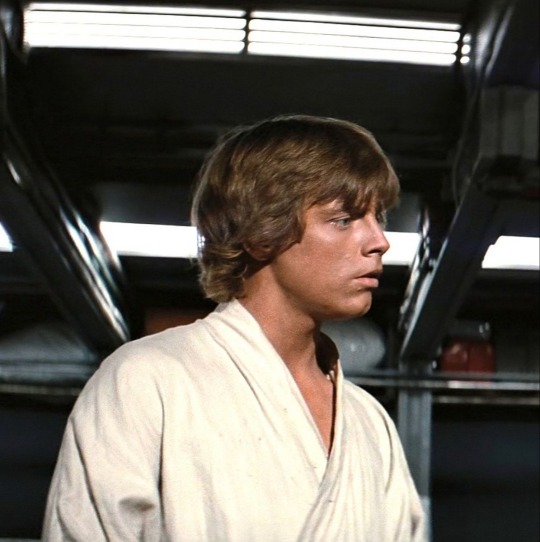



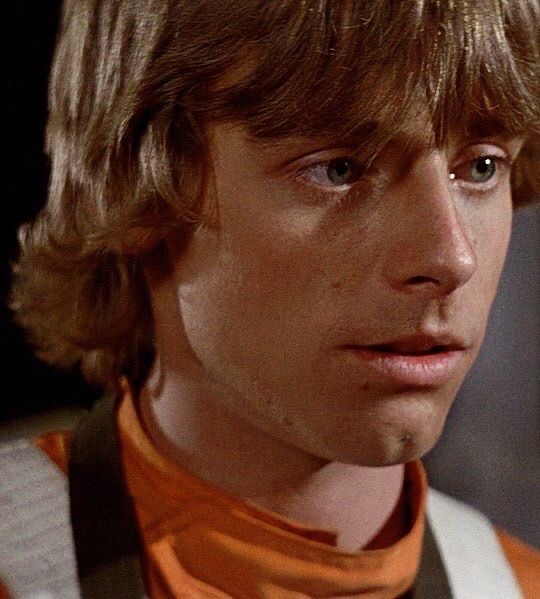


One of my favorite traits of his, which I have lovingly nicknamed “earmuffs”, are these floppy tufts of hair that cover his ears, feeding into his more puppy-like appearance. I think he looks naked without them, and it’s one of the first things I look for when people draw him.

A very popular part of mens hairstyles at the time, and he rocks it :3
#bro can not hear a word you’re saying#earmuffs#for the win#I never forget to draw them on him#they’re a crucial part of his design#luke skywalker#mark hamill#star wars#a new hope#empire strikes back#return of the jedi
330 notes
·
View notes
Text
Why Ambrosius and Ballister’s Relationship Feels So Different in the Movie (Nimona)
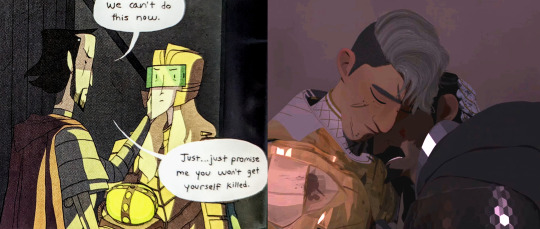
As someone who read Nimona countless times growing up, I am very familiar with the story and these characters. Which is why when I watched the movie, I was struck by how different Ambrosius and Ballister felt. They seemed like totally different and unfamiliar characters to me, and it didn’t have anything to do with their designs.
After rereading the original Nimona graphic novel recently, I’ve come to the conclusion that the main reason they feel like completely different characters in the movie comes down to one thing: the removal of the joust.
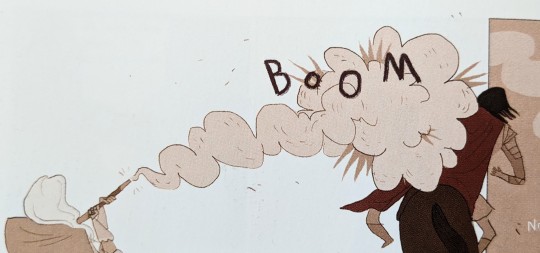
When I watched the movie, I was surprised by the fact that they changed the circumstances that drove these two apart. But it didn’t hit me just how much this one event shapes both of their characters and their relationship to each other until I reread the book.
The joust is CRUCIAL to their dynamic. It pervades every interaction they have with each other, they bring it up constantly, it is literally the crux of their collective storyline. We learn about it on PAGE 5 of the whole book, and their big heart-to-heart when Ballister is captured near the climax of the story is based around Ambrosius finally admitting the truth about what happened. Honestly I’d say that him finally coming to terms with what he did and apologizing for it is probably what allowed these two to finally find peace together by the end of the book.
We get something similar to it in the movie. Ambrosius still is responsible for Ballister losing his arm, but it is under WILDLY different circumstances. So I want to talk about how the joust affects them in the book, and then explain why the movie’s version of events, while similar on the surface, has a completely different effect on everything. So let’s get into it!
(All images of the book are via pictures of my own physical copy btw, so apologies if they’re not the best quality.)
(Also I want to make it clear that I don’t hate the movie nor its adaptation of these two. I do personally greatly prefer the book, but this post is not here to tear down the movie and exclaim that the book was way better. I just find it interesting how changing one event can have huge ripple effects!)
Part 1: The Graphic Novel (AKA: “My Boyfriend Shot Off My Arm Because of His Wild Ambition!”)
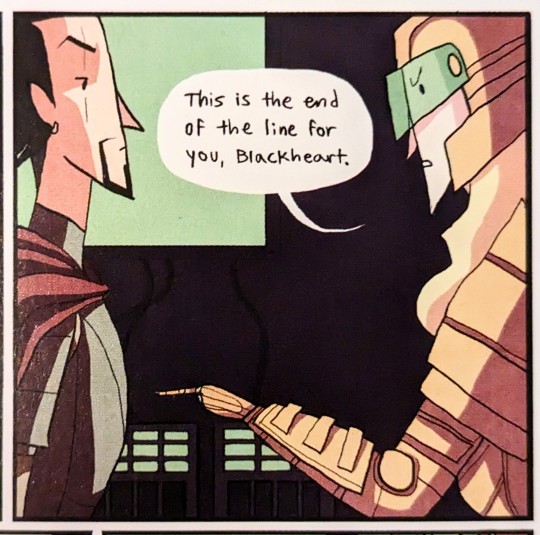
Like I said before, we learn about the joust very early on; Chapter 2, page 5. It is told to us first via Ballister’s perspective. Nimona asks if she can kill Ambrosius while they’re making evil plans, and Ballister says no -- if anyone is going to kill Ambrosius, it’s going to be him. We then get a flashback to the joust itself.
Ballister explains how they were friends and how the joust was the first time they had been pitted against each other. Ballister won fair and square, but in his words:
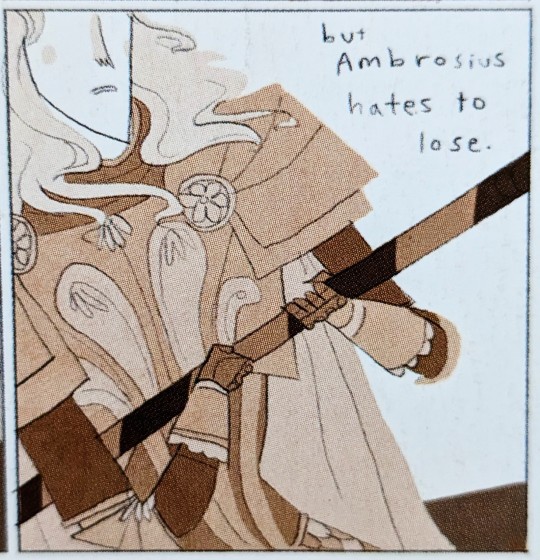
BALLISTER: “but Ambrosius hates to lose.”
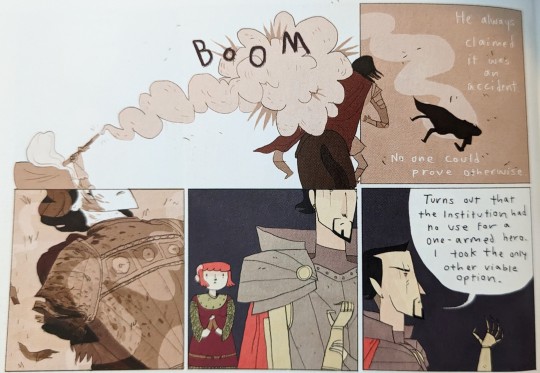
BALLISTER: “He always claimed it was an accident. No one could prove otherwise.”
BALLISTER: “Turns out the Institution had no use for a one-armed hero. I took the only other viable option.”
Ambrosius used a weaponized lance and blasted Ballister’s arm off. After the incident, Ballister was rejected by the Institution, and became a villain instead of the hero he had originally set out to be.
In Chapter 3 we see Ambrosius appear for the first time, and he and Ballister have a very relaxed sort of cartoon hero-villain dynamic going on. There’s definitely real animosity between them, but they don’t hesitate to simply talk casually to each other or help each other when things go south. It’s all pretty lighthearted and lowkey.
They fight briefly, but after Nimona triggers the building they’re in to self-destruct, Ambrosius doesn’t hesitate to help Ballister escape and Ballister doesn’t hesitate to accept his help. Ambrosius even tries to reassure him that Nimona will be fine. After they make it out, with Nimona presumed dead, Ambrosius puts a hand on his shoulder and tells him to go before more guards show up. They may be “arch-nemesises”, but they certainly don’t act like it.
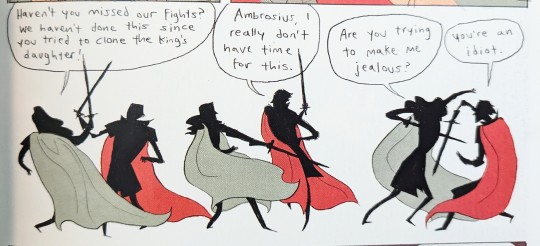
AMBROSIUS: “Haven’t you missed our fights? We haven’t done this since you tried to clone the king’s daughter!”
BALLISTER: “Ambrosius, I really don’t have time for this.”
AMBROSIUS: “Are you trying to make me jealous?”
BALLISTER: “You’re an idiot.”
By the way, I’m not going to be doing a full breakdown of every single scene with them, don’t worry. I just think that their first interaction shows off their dynamic very well. This is presumably how they’ve been with each other since the incident, as it’s made clear both here and throughout the book that they’ve both been doing this for a while at this point. They have a very established dynamic, which is important as that is one of the big differences between the book and the movie. (I’ll get into that more later.)
Whenever these two interact throughout the book, it’s clear that they have very different opinions on the incident that drove them apart and how their relationship functions now.
Ambrosius tries to act like it was simply an accident and that it doesn’t matter. Ballister became a villain of his own volition, and now they are arch-nemesises who have to fight because that’s their job -- though he doesn’t exactly act like he hates Ballister.
Meanwhile Ballister saw it as a deep betrayal, and while he definitely still cares deeply about Ambrosius, he cannot get over the incident as easily as Ambrosius can.
Their respective feelings about what happened are shown perfectly in the scene in Chapter 7 where Ambrosius invites Ballister to meet with him in secret. Ambrosius tells him that the Institution has ordered him to kill Nimona and begs him to send her away, both so he doesn’t have to kill her and so things can go back to “normal.” Ballister then says that Ambrosius gave up normal at the joust.
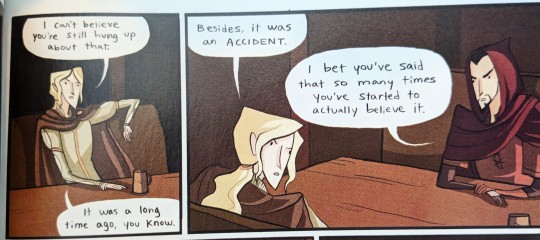
AMBROSIUS: “I can’t believe you’re still hung up about that. It was a long time ago, you know.”
AMBROSIUS: “Besides, it was an ACCIDENT.”
BALLISTER: “I bet you’ve said that so many times you’ve started to actually believe it.”
Ambrosius insists it was an accident, and Ballister claims that he blasted off his arm because he couldn’t stand that Ballister was better than him. This sets Ambrosius off and they begin to argue.
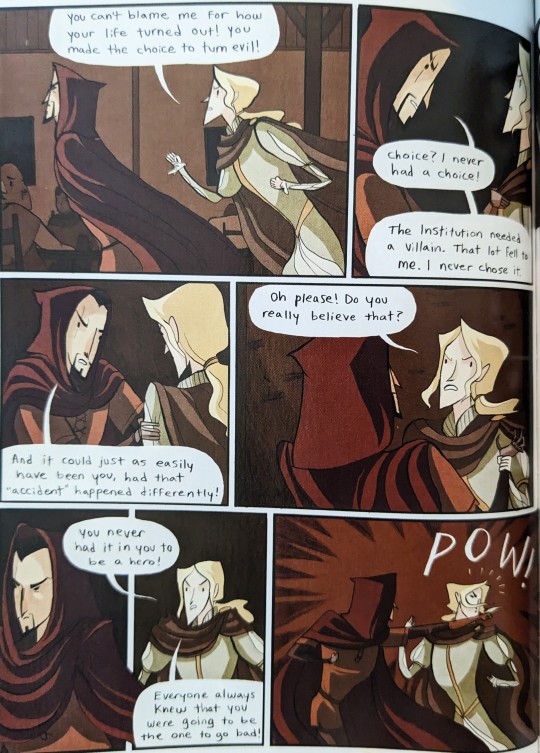
AMBROSIUS: “You can’t blame me for how your life turned out! You made the choice to turn evil!”
BALLISTER: “Choice? I never had a choice! The Institution needed a villain. That lot fell to me. I never chose it.”
BALLISTER “And it could just as easily have been you, had that “accident” happened differently!”
AMBROSIUS: “Oh please! Do you really believe that?”
AMBROSIUS: “You never had it in you to be a hero! Everyone always knew that you were going to be the one to go bad!”
Ambrosius has convinced himself that Ballister chose to become evil, and that he isn’t responsible for what happened because it was an accident. We later learn that it wasn’t an accident though, which means that this really is him just making excuses so he doesn’t have to accept responsibility.
Ballister brings up the idea of Ambrosius becoming like him again after they fight, in one of if not my favorite scene between them in the whole book:
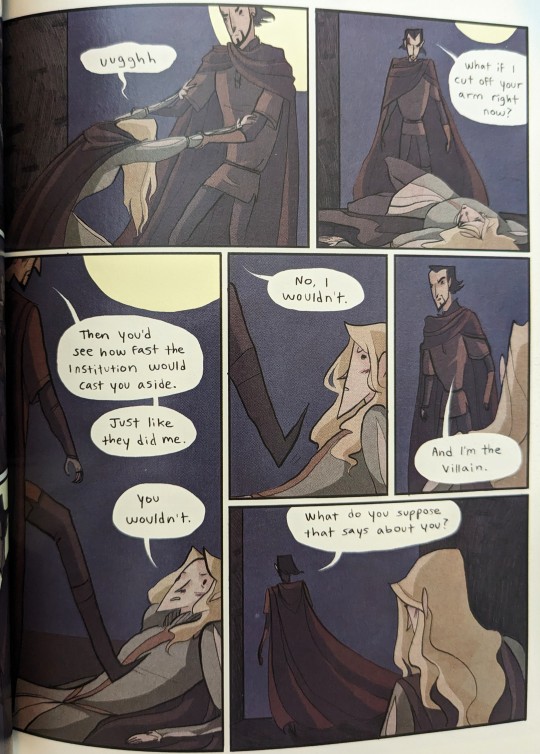
AMBROSIUS: “uugghh”
BALLISTER: “What if I cut off your arm right now?”
BALLISTER: “Then you’d see how fast the Institution would cast you aside. Just like they did me.”
AMBROSIUS: “You wouldn’t.”
BALLISTER: “No, I wouldn’t.”
BALLISTER: “And I’m the villain.”
BALLISTER: “What do you suppose that says about you?”
Ballister and Ambrosius are both very complicated individuals, and I think they lose a lot of their moral grayness in the movie. (Which I will get to later.)
Ambrosius is the “hero”, but it was his ambition that drove him to blast Ballister’s arm off, and he’s never accepted responsibility for it, instead trying to convince himself that Ballister turned out this way because of his own actions. But he doesn’t disagree here that the Institution would throw him out if he were to lose his own arm, which I think is very telling. He knows deep down that he is not a good person, and he is not working for good people. But he doesn’t want to admit it.
Ballister is the “villain”, but in many ways he is better than Ambrosius. He abides by his own rules of never killing unless it’s necessary, and goes out of his way throughout the book to make sure that as few people are harmed as possible. He knows that the Institution is corrupt, because he was one of the people it failed. And he works to try and bring it down.
Ambrosius cannot accept what happened, and because of that they aren’t able to get anywhere. They both know it wasn’t an accident. But because Ambrosius cannot admit it, they are stuck like this.
It’s a fascinating part of Ambrosius’ character that though he is adamant about Ballister being the one to destroy himself, he still cares about him. Much more openly than Ballister does in return, in fact. Ambrosius consistently does whatever he can to avoid having to kill him and always seems to have his wellbeing in mind. While he initially refused to kill Nimona, revolted at the idea that he should be ordered to kill “a little girl”, he eventually agrees to do so, but only under the condition that Ballister would be spared.
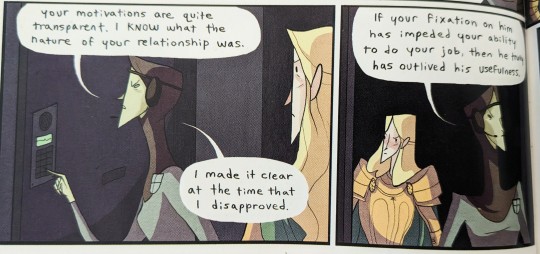
THE DIRECTOR: “Your motivations are quite transparent. I KNOW what the nature of your relationship was. I made it clear at the time that I disapproved. If your fixation on him has impeded your ability to do your job, then he truly has outlived his usefulness.”
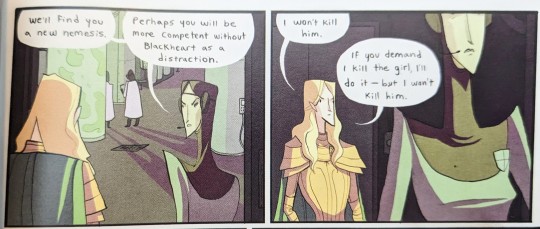
THE DIRECTOR: “We’ll find you a new nemesis. Perhaps you will be more competent without Blackheart as a distraction.”
AMBROSIUS: “I won’t kill him. If you demand I kill the girl, I’ll do it - but I won’t kill him.”
Despite him and Ballister’s separation being his fault, he is the one who wishes most for things to go back to the way they were. And this is likely why he refuses to accept responsibility about the joust. If it were truly an accident, then there shouldn’t be anything preventing them from continuing to be together. By painting it as an accident, Ballister becomes the villain for refusing to move on and let things go back to the way they were, not Ambrosius.
But finally, after Nimona disappears and Ballister lets himself be captured, we get probably the most important scene between these two. Ambrosius has been demoted due to his failure to kill Nimona, and is now forced to guard Ballister’s cell. Ambrosius is at his lowest that he’s been throughout the story, disgraced and discarded by the Institution who he had always been so loyal to.
It’s notable that Ambrosius says here that they both know Ballister is not evil, since he has been paddling that idea this whole time that Ballister made the choice to turn evil. By admitting that he is not, it shows that he is both starting to turn against the Institution, and starting to be more honest about what really happened.
Naturally, after Ambrosius wonders how things ended up like this and reminisces on when they were together, Ballister once again brings up the joust. And finally...
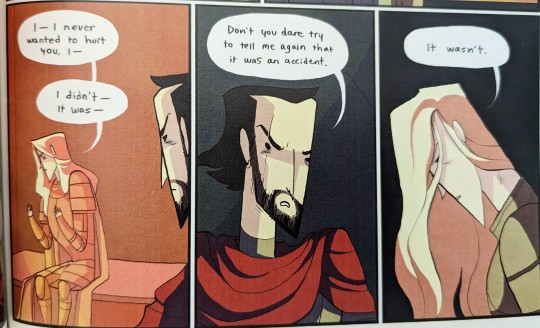
AMBROSIUS: “I- I never wanted to hurt you. I- I didn’t- It was-”
BALLISTER: “Don’t you dare try to tell me again that it was an accident.”
AMBROSIUS: “It wasn’t.”
...he admits the truth.
Ambrosius shares his side of the story, letting both us and Ballister in on what really happened that day. It wasn’t fully his fault -- the Director had called him into her office the night before the joust and told him that he had promise, that he was her choice out of the two, but that he had to prove himself against Ballister or that opportunity would go away.
On the day of the joust, Ambrosius received a weaponized lance instead of his regular one, which he instantly noticed. He asked what the Director expected him to do with it, and was told that she expected him to win.
To Ambrosius’ credit, he had no intention of using it, as he was confident that he would win. But the weight from the weaponized lance threw his balance off, and he ending up losing. And so...
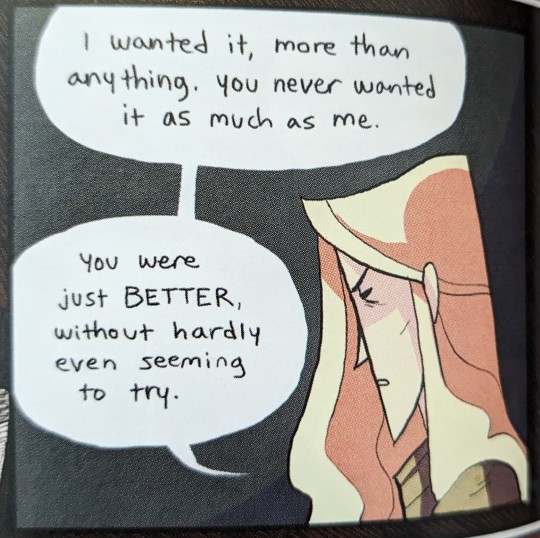
AMBROSIUS: “I wanted it, more than anything. You never wanted it as much as me. You were just BETTER, without hardly even seeming to try.”
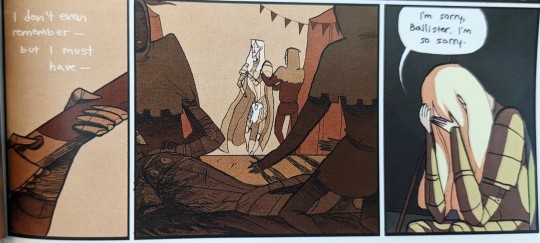
AMBROSIUS: “I don’t even remember- but I must have-”
[...]
AMBROSIUS: “I’m sorry, Ballister. I’m so sorry.”
To be fair, Ambrosius is not entirely to blame here. I doubt he would’ve come up with this idea on his own; he only acted on it because the Director had already given him the weaponized lance, and stressed the night before that the opportunities she dangled in front of him would not be given to him if he did not win. He was manipulated.
But he still made the decision to do it. He could’ve simply not used the lance. But he chose to. It is his fault.
It’s fascinating that the version of events Ambrosius had been swearing by this entire time is the exact opposite of what really happened. He claimed that it was an accident, he didn’t choose to do it, he had no choice, and that it was Ballister’s choice to become evil that caused all of this. But in reality, Ambrosius was the only one who got a choice here. And that choice is why their relationship was destroyed.
Ballister then brings attention to something even more damning:
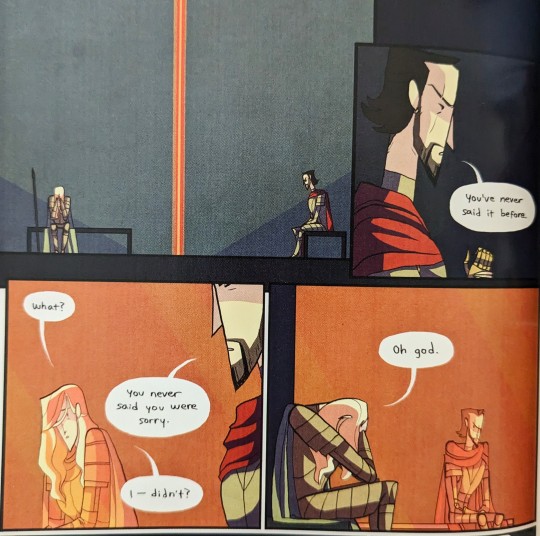
BALLISTER: “You’ve never said it before.”
AMBROSIUS: “What?”
BALLISTER: “You never said you were sorry.”
AMBROSIUS: “I- didn’t?”
AMBROSIUS: “Oh god.”
I feel like you could interpret this in a lot of different ways, but the way I see it, they probably didn’t see each other much right after the incident. Ambrosius was catapulted into stardom as the kingdom’s beloved knight, and Ballister became a villain. I don’t think they really interacted much until their hero-villain antics started up, so I don’t think Ambrosius really had a chance to apologize. And if he did, he didn’t think to. Regardless of why, I do think it is messed up that he never apologized, and it goes to show just how much this event destroyed the bond they used to have.
From here, there’s not too much, as Plot Stuff starts getting serious around this point. Ambrosius ends up betraying the Institution after they continuously attack Ballister to provoke Nimona, attacking the guards who are holding him. This is when Ambrosius finally chooses Ballister over the Institution, which is great for his character, but there’s not really much more than that to say about it.
He and Ballister plan together to try and save the kingdom, with Ambrosius being adamant that they have to kill Nimona while Ballister refuses to. It’s during this conversation that Ambrosius mentions that he “never did anything good [his] whole life”, which is really sad but also kind of accurate, and it goes to show how he’s finally accepted responsibility for everything he’s done and had a part in up to this point.
Eventually Ballister is able to find a way to nerf her and they split up, with Ambrosius wanting to tell him something in case they don’t see each other again, but Ballister shuts him down.
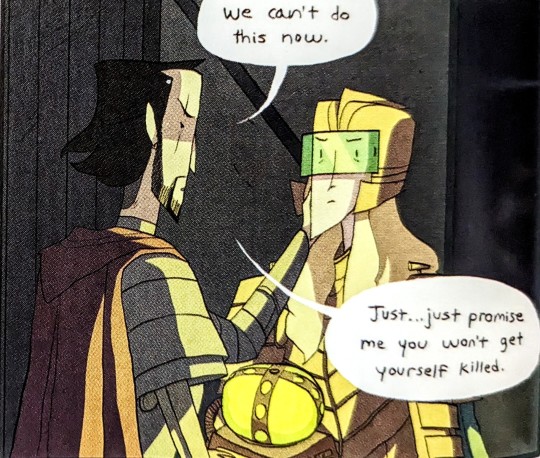
BALLISTER: “We can’t do this now. Just... just promise me you won’t get yourself killed.”
It’s easy to assume this was something romantic and it likely was, but I imagine Ambrosius could’ve also wanted to say sorry again for everything. Perhaps it would’ve been a mix of both.
Regardless, they split up and climax stuff happens: Ambrosius attempts to kill Nimona but gets seriously injured, Ballister tries to reason with Nimona, etc. etc. Eventually at the very end, we see that these two have made peace and are together again, living on after everything. And that’s these two in the book!
Whew. I know that was a lot, but don’t worry. I won’t be going into as much detail about the movie’s version of events, as Ambrosius and Ballister have a much more cut-and-dry dynamic there than in the book. Their relationship in the original is very complex, so I wanted to make sure I covered all of those little nuances.
The joust is what defines their relationship and a lot of their respective characters; it is unimaginably important. Ballister became a villain because he lost his arm and was cast aside by the Institution. Ambrosius became the kingdom’s hero because he took Ballister out of the picture. They are unable to be around each other normally for very long because of their divided views of what happened. It is only after Ambrosius finally faces the truth that they are able to find peace together once more.
All of this is to say that it’s extremely hard to imagine what their relationship would be like in the graphic novel had the joust not happened the way it did. Which brings us to...
Part 2: The Movie (AKA: “My Boyfriend Sliced Off My Arm Because I Literally Killed Someone!”)
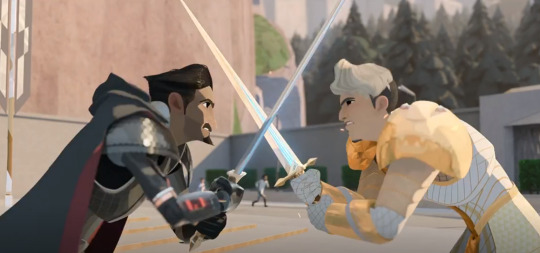
Before we start, I want to again stress that I am not trying to argue that any changes made here are inherently inferior. I am merely pointing out the differences between the book and the movie that contribute to the overall dissonance I and many others have felt when it comes to these two across versions.
Right off the bat, we are greeted with the movie’s version of Ambrosius and Ballister’s backstory. Like was implied in the book, they appear to be together (or something along those lines) which is great to actually see. But it quickly becomes clear that the events here are far different.
Instead of a joust, it is a knighting ceremony. There is no competition between Ballister and Ambrosius here. Ambrosius is knighted and cheered for, and then it is Ballister’s turn. He is knighted and everyone is silent before breaking into cheers as well. And then...

...his sword suddenly turns into a cannon and kills the queen. And in retaliation...


...Ambrosius chops his arm off.
Now if you’ve listened to ANYTHING I’ve said so far, this should immediately set off alarm bells. Because this one little difference changes everything about these two’s dynamic.
In the book, Ambrosius shot off Ballister’s arm in order to win his position. It was an entirely selfish and evil action spurred on only by his uncontrollable want to be the winner.
But here, Ambrosius is debatably justified in his response. Sure, he didn’t have to be as drastic as slicing his whole arm off (and I know there’s symbolism there with how the kingdom has taught people to get rid of problems), but Ballister -- to him -- literally just shot the queen. The queen who Ambrosius has sworn to protect. It is completely reasonable for him to respond in this way. And that’s a huge difference.
By changing this, we already have a completely different situation. Ambrosius here didn’t particularly want to cut Ballister’s arm off, it was a reflex, a response to a sudden danger. (Not saying he wanted to in the book, but there he made the deliberate decision to do so. In the movie it seems much more like an actual accident -- an overreaction that he immediately regrets and, as we’ll see, continues to regret.) And there was justification for it. There was no justification for it in the book.
Instead of an Ambrosius whose ambition caused him to commit an evil act of betrayal against the man he was closest to, we now have an Ambrosius who, in the heat of the moment, overreacted like he was trained to after Ballister seemingly betrayed him. We’ll see over the course of the movie how this affects things, but that’s not the only major change here.
As we figure out shortly afterward, the movie makes a huge change when it comes to how the story functions, and that’s the timeline of events. In the book, the joust and the subsequent fallout between Ballister and Ambrosius happened years ago. We don’t know how long, but it’s clearly been a while. Enough time has passed where they are fully settled into their roles as hero and villain, and they look significantly younger in the flashbacks as well.
Like previously stated, book Ballister has been a villain for a while. He is completely settled into this role and has been making schemes and having fights of the week with Ambrosius for a considerable time. He knows what he’s doing. He has his own way of doing things, and when Nimona inserts herself into his life much of their early dynamic is him teaching her how he does things. In the book, Ballister is the teacher, Nimona is the student.
But in the movie, this incident just happened. It's unclear how exactly long it's been, but judging from Ballister's arm being created and his wounds healing it's probably been around a month.
Regardless of exactly how long it's been, the point is that these events are still very fresh. Ballister seemingly has just been laying low, not villain-ing it up, and he and Ambrosius haven't seen each other since the knighting ceremony. This changes literally everything about Ballister’s character. This post is specifically about Ambrosius and Ballister’s dynamic and not a Ballister character analysis so I’ll try to keep it brief, but movie Ballister seriously could not be more different from the book.
Compare this to movie Ballister, who I’m pretty sure never knows what he’s doing ever, at any point. He was training to be a knight. He has seemingly never once questioned the Institution. Now he has suddenly lost his arm and been thrust out into the unknown of being treated as a villain, and he has no idea how to handle it. Then Nimona shows up, tells him “hey, the Institution sucks”, and eventually he ends up believing so as well. In the movie, Nimona is the teacher, Ballister is the student.
Book Ballister actively resents the Institution and has no doubts that what they did to him is wrong. He has been plotting their downfall for a while. Nimona, on the other hand, seems to be out of the loop when it comes to the Institution and seemingly only starts hating them after she finds out how they threw Ballister out. Again, I’d just like to stress how completely and totally opposite their dynamic in the movie is compared to this.
There’s also Ballister being a scientist and being much more jaded in the book, but that’s not really important for the purposes of this post. So alas, I shall move on.
This different timeframe greatly impacts Ambrosius and Ballister’s dynamic, and obviously it would. There is a huge difference between a falling-out that happened years ago and you’re both still bitter about, and a falling-out that happened very recently. This, along with the different course of events resulting in said falling-out, is what causes their dynamic to feel so alien.

Also while talking about their early interactions in the movie, I’d just like to point out that while here Nimona is the one to assume Ambrosius is Ballister’s arch-nemesis and call him such, which Ballister doesn’t agree with, they were actually arch-nemeses in the book. Just something I noticed.
Something else I find interesting is later on, Ballister seems to be almost in disbelief about Ambrosius cutting off his arm and makes excuses for him.

BALLISTER: “He didn’t cut off my arm. He disarmed a weapon.”

BALLISTER: “It’s how we were trained.”
(Side note, but I wonder if book Ballister ever felt this way right after the joust? Did he try to convince himself it was an accident too, once upon a time? Did he try to make excuses?)
And to be fair, he is sort of right. Like I said before, Ambrosius’ reaction to Ballister seemingly killing the queen was debatably justified. While we’re obviously supposed to side with Nimona here and agree that Ballister should be more upset at Ambrosius for what he did, the movie definitely paints Ambrosius as more sympathetic overall. We see him freaking out internally about cutting off Ballister’s arm, and there is a lot of emphasis placed on how he and the others were trained by the Institution, inviting the audience to place more of the blame on the system that taught Ambrosius to act this way rather than him as a person.
And again, I’m not saying this is a bad thing! I love a good "taking down a corrupt system” story, and with the different circumstances of the movie it definitely makes more sense to play it this way. But in comparison to the book, Ambrosius is much easier to sympathize with. His character is changed from a very morally gray person who did something horrible and won’t admit it, to a pretty okay person who did something horrible and wholly accepts and bemoans that fact. He’s almost the opposite of what he was in the book.
So we have an Ambrosius who accepts what he did to Ballister and feels awful about it, and a Ballister who has no idea what he’s doing and is basically just being dragged around by Nimona. With both of them being basically the complete opposite of how they were in the book, is it any wonder that their relationship with each other feels so different when they themselves are so different?
Also, once again, the circumstances are very different. There is no Queen murder plot in the book, nor is their any attempt to clear Ballister’s name. A significantly different setting makes a difference too.
I don’t see a need to go into further detail about specific scenes in the movie as I think I’ve made my point clear. But going back to the movie’s lack of Ambrosius and Ballister’s already established hero-villain dynamic, I think these differences are made quite apparent just contrasting how they talk to each other. I mean, just compare these two scenes:
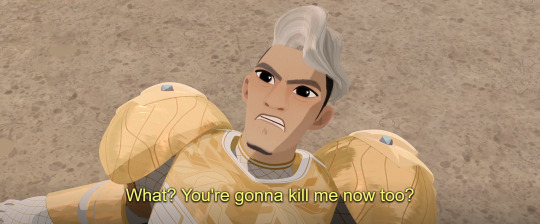
AMBROSIUS: “What? You’re gonna kill me now too?”
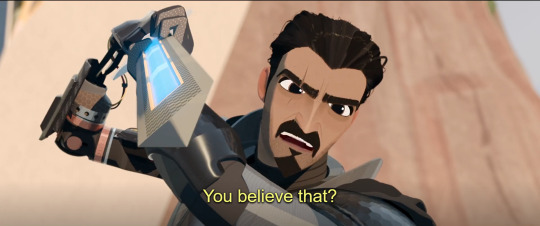
BALLISTER: “You believe that?”

BALLISTER: “Then you never knew me at all.”
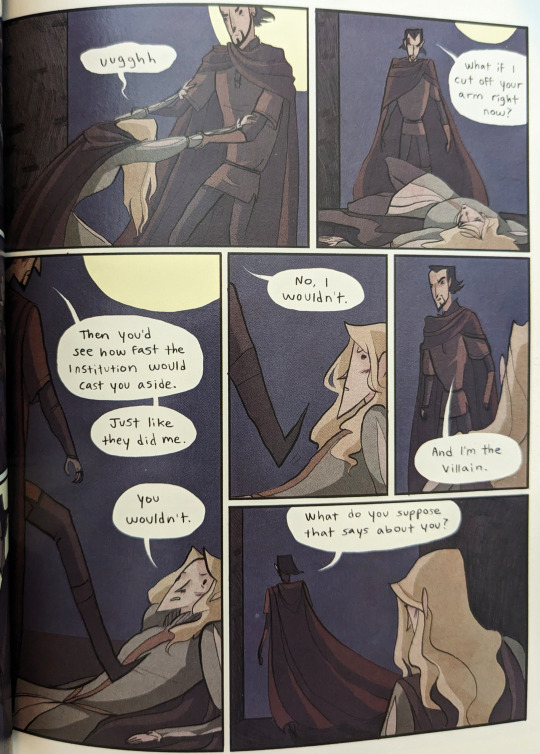
AMBROSIUS: “uugghh”
BALLISTER: “What if I cut off your arm right now?”
BALLISTER: “Then you’d see how fast the Institution would cast you aside. Just like they did me.”
AMBROSIUS: “You wouldn’t.”
BALLISTER: “No, I wouldn’t.”
BALLISTER: “And I’m the villain.”
BALLISTER: “What do you suppose that says about you?”
Their relationship in the movie is much softer and healthier than it was in the book. Their dialogue in the movie tends to lean much more towards tried-and-true “friendship betrayal” stuff; the wound of Ballister’s “betrayal” may be fresher, but it’s clear both of them love each other far more than they resent each other. In the book, it is the opposite. The movie could NEVER have the bar fight scene. It’s too ugly and bitter to fit these softer versions of Ambrosius and Ballister.
Part 3: Conclusion

So, that was a lot. I hope it’s a little clearer now how big the differences are between these two’s dynamic in the book and the movie! Especially if you’re someone who is only familiar with one or the other. While I prefer the book due to me tending to prefer more complex and messy relationship dynamics, I totally understand the appeal of the more loving and healthy relationship Ambrosius and Ballister have in the movie.
To summarize, here are some of the main takeaways:
Ambrosius causing Ballister to lose his arm is completely unjustified in the book and happens due to Ambrosius’ wild ambition, while in the movie it is a debatably justified reflexive action in response to an active threat.
Ambrosius overall is portrayed as much more sympathetic in the movie, with the system itself being more to blame for what happened.
In the book, the main thing keeping them apart was Ambrosius’ refusal to take responsibility and admit what he did. In the movie, it’s a misunderstanding about Ballister seemingly turning evil.
In the book, Ambrosius and Ballister have a very established hero-villain dynamic with the joust having happened years ago. In the movie the “betrayal” is still very fresh, which leads to very different interactions between the two.
And that’s about it! Thank you for reading this very long post. And if you haven’t read the original graphic novel or watched the movie, go do that!!! Much love to ND Stevenson and the rest of the people who made this story come to life.
Let me know your thoughts in the tags or the replies! Which version do you prefer? Are there any other factors you feel have a significant role in why their relationship feels so different? Or do you think I’m totally wrong about this and they feel basically the same to you?
Either way, thanks again for reading and goodbye!
#nimona#ballister boldheart#ambrosius goldenloin#analysis#meta#ballister x ambrosius#ambrosius x ballister#nimona movie#nimona graphic novel#nimona analysis#ballister blackheart
763 notes
·
View notes
Text
Hold On
Simon ‘Ghost’ Riley x Kyle ‘Gaz’ Garrick
TW: MDNI 18+, mlm, minor piss kink, oral m!receiving

“Two hours to exfil, keep yourselves out of sight and off comms until then,” Price instructs over the radio.
“Solid copy,” Ghost answers and puts the radio away.
“Guess we just sit tight then,” Gaz muses, stepping back from the grimy window of the tiny, dirty room the pair have been crammed into for the last week. They had been watching their target’s movements across the street through these filthy panes, taking shifts resting on the threadbare, musty sofa bed. They had enough water bottles and MRE to last them another day, but thankfully they had everything they needed and could get out of there once the transport arrived.
For now though, Gaz was busting for a piss. He’d been holding it for hours as the crucial part of the objective took place, years of discipline and training helping him keep himself steady, plus the lack of any nearby water bottles which would have done nicely. He could feel the pressure building and it was starting to have an affect on him. He shifted uncomfortably, trying to discreetly adjust his semi-hard cock. If he'd been here with Soap he would have been more casual about it but with Ghost… something made him a little more reserved. He put it down to him being his superior officer, but then again, he’d be more relaxed with Price so that wasn’t it.
“Gotta take a leak, my back teeth are floatin’,” Gaz says, getting up from the rickety folding chair that was the designated spot for observation. A car pulls up outside unexpectedly, and Ghost presses him against the wall out of sight.
“Wait, movement,” the Lieutenant says quietly, focusing outside as three men get out of the car and mill around on the pavement with no clear objective yet. Gaz watches them too, trying not to think about the way Ghost is pressing against him, his thick thigh against Gaz’s crotch and most likely feeling what’s going on down there. If he does, he says nothing. That’s until he moves his leg, grinding against the rapidly hardening length and putting pressure on the equally turgid bladder beyond.
“You really gotta go, huh?” Ghost asks, hearing Gaz trying to suppress a groan, but still watching the men by the car. They’re just standing there, smoking and making no sign of going into the building.
“Yeah,” Gaz manages to answer, voice slightly strained and the heat in his groin spreading and becoming more demanding with the weight of Ghost pressing against him. There’s a subtle movement from the larger man’s thigh, like he is rubbing against the ridge outlined in Gaz’s trousers, creating friction that only stiffens him further. Sweat prickles his upper lip behind his mustache, and he sucks at his full lips trying to ignore the sensation.
“Ah, they’ve moved on,” Gaz observes, trying to remain composed, and turns to look at Ghost. The man has been watching him the whole time, studying his reaction up close.
“Yeah, they weren’t anything to do with the target,” he replies, looking down at the Sergeant.
“Then why were we watching ‘em?” Gaz asks with a frown.
“I wasn’t, you were,” Ghost answers, the movement of skin around his eyes hints at a grin under his balaclava. With an annoyed grunt Gaz shakes his head and shifts his weight to get away but is forced back by Ghost’s hand wrapped around his neck, pushing him against the wall once more.
“Do you trust me?”
“Of course I do, all the way,” Gaz answers without thinking, frowning at the question and how absurd it is.
“Good, then don’t argue,” he says, grinding his knee harder between Gaz’s thighs and drawing a startled moan from him. He’s completely hard now, Ghost’s thigh moving back and forth more and more, causing Gaz to groan in a tortured mix of pleasure and discomfort.
“Shit… Lt, you need to stop or we’re gonna get messy,” Gaz moans, his hands reaching for Ghost’s hips, but wether to stop him or encourage him to move more is lost in a fog.
“You really think you can piss through that right now?” The masked man asks wryly, and Gaz can only shake his head, his eyes rolling shut. “Well then, this is a welfare issue I need to address.”
Gaz lets himself be manoeuvred to the sofa, dropping back into it carefully as Ghost kneels between his knees on the ground.
“Keep your hands to yourself, Sergeant. Understood?” Dark eyes burned like coals, strangely accentuated by the black paint around them. Gaz can only nod once, mouth too dry to answer as he looks down his own prone body, the monster of a man between his legs drags his gloved hand down the front of Gaz’s trousers clearly outlining his erection.
“Fuck,” Gaz huffs out, a toxic mix of shame and excitement burning his throat. He drops his head back and stares at the ceiling, feeling the tug of fabric as Ghost pulls down his fly. Fabric rustles and then warm skin touches his cock, pulling it out into the cool air, sending a shock up his spine that threatens to shut down his brain. Risking his sanity, he lifts his head and looks down again. Ghost has removed his gloves to free Gaz’s cock, and has peeled the bottom of his balaclava up over his nose to reveal his wicked smirk as he holds the freed length in his fist. The scar on his lip tugs at the skin giving his smile an evil quirk, matching the look in his eyes.
“Are you still with me?” He asks, voice rumbling deeper than usual and, fucking hell, Gaz’s cock twitches in response.
“Yeah, I’m solid,” Gaz breathes.
“I’ll say,” Ghost replies and gives his fist an experimental pump, making Gaz’s hips twitch.
“Oh fuck!”
“Steady, don’t lose it yet,” he chuckles darkly, and pumps his hand slowly over and over. All Gaz can do is grasp tightly onto the fabric of the sofa cushions, knuckles aching with the power behind his grip. Ghost’s rough hand wraps around his shaft, running from base to tip over and over spreading the leaked pearls of precum, sending waves of electricity through Gaz’s body. Hot, wet breath drifting over his flushed tip is the only warning he gets before Ghost’s mouth descends and envelopes it.
“What the…. Holy shit, Lt,” Gaz huffs and sinks his teeth into his bottom lip to control his moans. The feeling of hot, wet mouth around his cock becomes the only thing he can concentrate on, and when Ghost pushes the flat plane of his tongue down the shaft his hips buck which sends a jolt through his full bladder. The fear of coming too soon or pissing in his Lieutenant's face runs a cold spike through his gut.
“Lt…” Gaz grunts, not sure if he should say anything or try and ride it out.
“Quiet, it’ll be easier to piss afterward,” Ghost rumbles, and drops his head back down without hesitating, the rosy tip of Gaz’s cock quickly swallowed once more and a guttural moan bubbling from his chest in response.
His toes curl inside his boots as he feels that hungry mouth working closer and closer to his pelvis, swallowing every damn inch of cock on the way. It’s been a while since someone was able to take him all the way to the hilt and Ghost isn’t messing around. The tight ring of muscle at the back of the man’s throat gives way and Gaz sinks into his throat with a primordial growl. The urge to grab the back of the Lieutenant's head is strong, but he manages to fight it and is rewarded with a shallow bobbing of his head, grinding his sensitive head back and forth across the muscle and destroying all thoughts inside his skull.
Ghost hollows his cheeks, sucking on the blushed head of Gaz’s cock then alternating with taking the dark shaft deep into his throat again. Wet sounds accompany the gruff moans of ecstasy, along with the occasional soft gag as Gaz’s hips press upwards and drive his length further and deeper. Nothing stops Ghost as he drives Gaz harder and higher, ready to shatter him to pieces.
Gaz’s thighs shake uncontrollably, a tiny trembling in the muscles as he nears his limit. His abdominals clenching tightly as he holds his breath, his orgasm building and making him gasp for breath in short, needy moans as Ghost expertly takes him higher and higher, threatening an unearthly drop once he peaks.
“Ghost… I’m gonna…” he blurts a warning, not enough breath in his lungs to complete the sentence. The head of his cock is so swollen, so sensitive to every ridge in Ghost’s throat he can’t take any more and with an explosive breath he breaks, unloading straight down the Lieutenant’s throat as he drowns in euphoria.
“Fuuuuuck…!” He groans, vision spotted with black around the edges and the cords of his neck standing in stark relief as his body releases the pent up tension.
At the last minute he is able to pull it back, preventing him from pissing, and the tightening of muscles sparks a vicious aftershock. Ghost sits back, wiping his mouth on the back of his hand, lips swollen and plump.
“Better go for that leak now, Sergeant,” the bastard grins and stands up slowly on aching knees, watching as Gaz gingerly rolls off the bed and staggers to the small bathroom to finally relieve himself and clean up before Price arrives in the car, mumbling thanks under his breath is a haze.
——————————————————————-
To be added to my taglist please complete this form and remember to reblog if you like it!
Taglist lovelies:
@thriving-n-jiving @iloveslasher @southernpsychgirl @bossva @xxladysquishyxx @murder-hobo @aulescev @tiredmetalenthusiast @Voidthewriting @evolutionarry @lunamoonbby @cryingpages @daniblogs164 @rantingraquel @letmelickyoureyeballs @emotion-no-hot-yes-hotel-trivago @thatonepupkai @fluffysmiko @Codgirlie @ashy-kit @bloodstoneruby @cassiecasluciluce @mandythemint @ihatethinkingofnames10 @cringeycookies @ttsbaby01 @Raniyahxo @katzykat @airyonna15 @nobilitando @neoarchipelago @kaoyamamegami @dij-ology @thatoneslvt @vexshira
#cod smut#gazghost#ghostgaz#ghost x gaz#gaz x ghost#kyle gaz garrick#simon ghost riley#cod mwii#cod mw22#cod mw2#cod modern warfare#ghost call of duty#cod 141#call of duty smut#mlm nsft#mlm ns/fw#mlm#call of duty ghost#ghost mw2#mw2 ghost#ghost call of duty mw2#gaz smut#call of duty gaz#gaz modern warfare#gaz call of duty#kyle gaz garrick cod mw#ghost smut#cod 141 smut#cod mw2 smut#simon ghost riley cod
142 notes
·
View notes
Note
you cantttt just say rosquez feminization and not elaborate…. penny for your thoughts
shout out to @lestelledreams who sent me another ask like this but tumblr ATE my response when i tried to post it. luckily i draft in notes app…okay so it would be easier to list thoughts i DONT have about rosquez feminization… under the cut bc we do in fact get a lil nasty here
so i’ve talked a bit about some of the non-racing oriented things marc does for his body like his hot girl routine (laser hair removal. skin creams. slutty workout videos) like my girl enjoys being SMOOTH he enjoys being conventionally SEXY (personally. bush til i die but whatever live your truth marc) and the first time he’s doing it as. okay i’m famous and photographed all the time AND around my hot older crush/idol who has fucked more people than i’ve ever even met in my lifetime… like a little insecure part of marc is like this is what vale wants… and one thing about my man marc is he will COMMIT. so he waxes himself hairless the entire time they are fucking the first from 2013-2015 (and beyond) and frankly vale would like him either way but MARC gets off on it so hard… making himself pretty for vale… and maybe vale says something like that in the moment, just like mindless dirty talk about how good he looks how he made himself all pretty like a girl, and marc jolts like he’s been electrocuted and whines and comes right then even though vale had like JUST got inside him… and he’s curled around vale panting eyes shining leg hitched around vale’s hip asking him to keep going and it’s SO clear he liked whatever that was a LOT.
so vale uh. catalogs that information. and starts to test some hypotheses #olditalianmeninSTEM by which i mean the next time marc is blowing him he curls his hand into marc’s hair and tugs a little until marc looks him in the eye and vale just sends it like they’re whipping 310km/hr around the track— like breathless mischievous confidence… starts feeding him a stream of dirty talk, calling him gorgeous telling him nasty stuff about his tits riding that lovely edge of complimentary and degrading and getting sooo gender about it, and he watches marc’s eyelashes flutter and his hand on vale’s hip tightens and then marc like. literally chokes himself on valentino’s dick he’s clearly so so into it and vale feels crazyyyyyyy… SORRY..
and then it’s onnnnn baby it is. using the feminine forms of italian endearments in bed. playing with his tits. losing the condom. weird roleplay where they laugh so much. it is delightfully horny and slightly goofy gender transgression that they are both SO obsessed with… like the sex whiplashes through tonal dissonance it is simultaneously the most intense thing they’ve ever felt and like. lethally campy. at one point they are BOTH the baby girls bc they love being hot and are not serious people
that being said it culminates with vale just like. buying disgustingly expensive neon yellow designer lingerie and leaving it in marc’s motorhome with a lil note that has like. a dumbass turtle doodle on it instead of his signature. like something very silly and valentino. and then they have the WORLD’S most insane sex about it where vale says all kind of nasty stuff about marc being his best girl and spits in his mouth and tries to get him pregnant. hashtag catholic weirdo moments. crucially it is never formally discussed until like. genuinely ten years later when vale is like impish nervous smile WE REALLY SHOULD HAVE TALKED ABOUT THAT EH? and marc’s like ? best sex of my life? wdym?
#i love them they’re like one big red flag. NOT the racing kind…#PLEASE know. i am a lover and haver of body hair this is just what i think would go on in their brains vis a vis their perceptions of gender#and marc’s deep commitment to being smooth all over like a dolphin#callie speaks#motogp#rosquez#asks
87 notes
·
View notes
Text
Avatar the Last Expositionbender: Thoughts on the new Netflix adaptation from a near 20-year-long fan of ATLA (first three episodes)
Disclaimer: I’ve been a huge fan of ATLA since literally the day it dropped on February 21st, 2005. I’ve probably seen the original show at least 200 times all the way through. That said, I absolutely am trying to go into this Netflix show with an open mind. I don’t want to denigrate it just because it’s not exactly the same as the original.
I can't draw any final conclusions because I've only watched through episode 3, but my impressions are... not good. I’m going to try and leave some of the nitpickier stuff to my live tweeting thread and just focus on the big things here.
My biggest takeaway thus far is that the show has decent to great special effects, set design, and cinematography, and it is just ALL completely let down by an atrocious script and bizarre changes to both the plot and characters. I don’t think any one decision is the decision that’s breaking this show for me. I think it’s a death-of-a-thousand-cuts kind of breaking the show for me.
(A lot) more below the cut
Let’s start with the structure. The original ATLA is a serialized show (there is one overarching plot), but each episode is smaller scale with short plotlines that are resolved within the runtime of one or two episodes (leans more episodic). The Netflix adaptation seems to drop this format and centers the main plot in pretty much every episode. Many of the little stories still technically happen, but they’re reframed to be in service to the greater plot. E.g. They no longer visit Kyoshi because Aang just wanted to have a fun little adventure and ride some giant fish, he does so because he needs to learn more about the Avatar from Kyoshi.
This is not an inherently negative change, but it is a negative change in this case and I’ll tell you why: it completely destroys the character building that the original series was known so well for. Let me explain.
I can point to any episode in the series and immediately tell you if it's a Katara-centric episode, a Sokka-centric episode, a Zuko-centric episode, etc. I can tell you exactly what the characters did, what the themes were, and how the characters have grown from beginning to end. I can tell you the threads that were woven in which ultimately serve the larger plot, from huge shifts to tiny threads you wouldn’t even notice.
I’ll take episode 2 from the Netflix series and compare it to the three episodes I believe it’s based on: The Warriors of Kyoshi and The Winter Solstice (parts 1 and 2).
In the original series all three of these episodes are largely Aang-centric, with significant moments developing Sokka as well. Kyoshi is the point at which Aang’s lackadaisical attitude toward being the Avatar is significantly challenged for the first time. He spends significant time in Kyoshi being fawned over and messing around despite realistically having done nothing to earn that praise. It’s the damage to his friendship with Katara + Zuko coming in which ultimately humbles him. The Winter Solstice episodes are where Aang’s determination and goal is solidified and a sense of urgency is developed.
On Sokka’s end, Kyoshi is a significant moment for him as a character. He has some of his core beliefs challenged and not only does it humble him, he apologizes and works to better himself. In The Winter Solstice episodes (particularly part 2) we see, for the first time, glimmers of his ingenuity and his role as the idea/plan guy with how he develops a plan to open the door so Aang can speak to Roku.
In terms of the plot, The Warriors of Kyoshi ultimately doesn’t have much to say at this moment, but it is setup for later payoffs in seasons 2 and 3 (the Kyoshi Warrior ruse Azula pulls in Ba Sing Se, Suki’s presence in The Boiling Rock and subsequently joining the Gaang, etc.) so it’s not wasted. The Winter Solstice is where Aang gets crucial information about the world and solidifies his goal (stop the Fire Nation before the arrival of the comet).
Ultimately we discover something important about Sokka, and Aang has a significant moment of character development where he decides to put aside his own ego, stop messing around, and focus on saving the world.
What do we see in Episode 2 of the Netflix series?
Sokka has a kind of awkward relationship with Suki where she largely just kind of complains about being stuck on Kyoshi and acts like a massive bitch toward him for seemingly no reason (since they completely removed his sexism and thus his entire arc in that episode) but then they kiss anyway.
Aang gets shit on by the people of Kyoshi and then blasted by Kyoshi herself for not being determined enough in his quest and not understanding what it means to be the Avatar (even though in this version of events Aang never ran away from the Southern Air Temple he was just out for a lil fly to cool his head and got yeeted by the storm, and the entire reason he came to Kyoshi in the first place is so he could learn more about being the Avatar).
Katara is, uh, there and plays around with the waterbending scroll Gran Gran apparently had the entire time (so I guess we’re not covering The Waterbending Scroll in this show, aka one of Katara’s early defining character episodes).
None of them develop because they weren��t given any flaws to begin with. There’s nothing for them to overcome. The problems they overcame in the original episodes were taken out from the very start, which means they have nowhere to actually go.
And that might be fine if this wasn’t an Avatar the Last Airbender adaptation. You know, the show that is so well known for its character development that it’s often cited as one of the best examples of a redemption arc in fiction? That Avatar the Last Airbender show? Yeah…
Another problem, and I really can’t overlook this, is the atrocious script this show has. It feels like the characters spend 90% of their talking time either delivering bland exposition that was usually just shown to us in the original show, or monologuing about something. It feels like the writers had no confidence in their audience to actually follow what was happening or understand the themes, which is… embarrassing. This show is clearly not made for children at all based on the levels of violence depicted, and it’s not a great sign when the show made for ten year olds has more faith in its audience's intelligence than this one.
And really, I get that you’re probably going to have to combine episodes and cut out some things to fit a 20 episode season into an 8 episode season, but some of the choices for episodes they combined is just bizarre. Who on earth decided it would be a good idea to combine Jet, The King of Omashu, and The Northern Air Temple into one episode?
The original Jet is largely a Sokka-centric episode, dealing with his own insecurity as well as the group’s lack of confidence in him and his abilities. Yet Katara is almost exclusively the one interacting with the Jet plotline in the Netflix adaptation, and all of Sokka’s best moments from that episode are lost. Instead he spends most of this episode hanging out with Teo’s dad and establishing his interest in engineering (and weirdly shitting on Hakoda for some reason in the process?) which could have been established in an episode which shares a less Sokka-important plotline.
The Northern Air Temple is about Aang reconciling his conflicted feelings about refugees moving into a place that once belonged to his people, changing things, and adopting/adapting some of the Air nomad’s culture (such as the gliders). He ultimately comes to the conclusion that the Air Nomads are gone, but he’s happy new people have come along and carry their spirit. Because this episode takes place in Omashu in the Netflix adaptation, there is absolutely none of that conflict or growth over others using the space which used to belong to his people.
The King of Omashu is just a sweet, Aang-centric episode where he realizes he still has friends in the world, and establishes Omashu and Bumi for the world/later seasons. Bumi isn’t even in episode 3 of the Netflix adaptation physically until the end, and when he’s mentioned he basically gets shit on, treated as completely incompetent, and almost murdered by Jet. Though from what I gather based on the episode blurbs the substance of The King of Omashu is probably contained more in Episode 4, so we’ll see if my opinion changes after episode 4.
The act of combining episodes is not the problem. It’s the episodes they’ve chosen to combine. What they’ve done so far does not in any way take advantage of what the original show gave them to work with.
For example, Why not instead combine the Southern Air Temple, The Storm, and The Northern Air temple? All three episodes connect with the theme of Aang dealing with his loss. Just move Teo and his father to the Southern Air Temple instead of the northern one and keep their plotline the same. In the process Aang can walk the run down buildings and learn more about what happened, and at some point he can find Gyatso’s body and there can be flashbacks to him leaving the Southern Temple and he can talk about how guilty he feels.
(While I’m at it I think they could have more smoothly combined Jet with The Waterbending Scroll. Katara can steal the scroll and as they’re escaping they can run into the merry band of freedom fighters who hide them. Katara practices with the scroll while Jet encourages her which is part of why she takes such a liking to him, and Sokka has his arc with Jet. Maybe Jet could even dangle the prospect of getting rid of the pirates chasing them along with the town to try and bait Sokka to his side/convince him by exploiting his protective instinct, but Sokka still refuses.)
Basically, I wish they’d combined the episodes more on the basis of their interconnected themes rather than… whatever it is they were trying to do here.
Anyway I think that’s the big thrust of my criticisms of the show. Now I’m just going to do random miscellaneous complaining about character changes.
First, Aang is such a bland pile of nothing, and despite the writers claiming he’s more determined and a go-getter he has never, not ONCE stopped getting pushed around in the plot.
He doesn’t intentionally leave the Air Nomads of his own volition, he just happened to be out for a little fly to clear his head when a storm oopsied him into the plot. He gets bullied by Kyoshi for like four minutes straight into doing the thing he was already doing (going to the Northern Water Tribe) because she psychically knows that the Fire Nation is going to attack them later, not because he actually… y’know… wants to learn waterbending/wants to find Katara a teacher.
2) Sokka gives sociopathy with the delivery of some of these lines. The jokes are REALLY hit or miss and the acting is more miss than hit in this show (goes for everyone tbh, not even just the kids). I already complained about them removing his sexism and I can confirm the sexism is indeed gone. He does at least maintain his role in the comic relief department, but I can’t say I’m that thrilled they kept the literal least interesting part of his personality.
3) Katara is genuinely one of my favorite characters in media ever. Seriously I could probably make a whole other post about how much I love her, and I am so disappointed by what a bland ball of nothing she is so far. She has none of her edge.
You’ll notice that they’ve so far covered The Boy in the Iceberg, The Avatar Returns, The Southern Air Temple, The Warriors of Kyoshi, The King of Omashu, The Winter Solstice (1 and 2), Jet, The Northern Air Temple, and if I am being EXTREMELY generous The Waterbending Scroll (as in, there is technically a waterbending scroll and Katara does now have possession of it).
None of which are what I would consider Katara-centric character development episodes, and the moments she does have in those episodes appear to be mostly cut out or overlaid with bizarre PTSD flashback nightmare fuel. I’m not trying to imply that the show won’t get better about her, but I’m not a huge fan of having a lot of her moments stripped out and her characterization reduced to “yeah she’s traumatized”. Honestly depending on how the rest of this season goes you might have to deal with a big long ramble just like this on just Katara. Katara Alone, if you will.
4) I have no idea what’s even going on with Zuko. They covered Aang’s half of The Storm in pretty gruesome detail but completely neglected Zuko’s entire half of that episode. Thus far he feels like he’s getting pushed around by the plot just as much as Aang. And he has to share villain screentime with Ozai and Azula for whatever reason. Also, they wussed out on that scar.
Iroh is in a similar boat to Zuko. It just feels like the Netflix adaptation doesn’t have nearly as much interest in developing Zuko and Iroh as the original show did. Which is really disappointing. One of the things that made Zuko’s redemption so good was because he and Iroh were such a presence in the show from the very beginning. They very frequently, even if they’re not directly interacting with the Gaang, dominate the episode B-plot. His redemption simply does not work if you don’t have that.
5) Zhao is such a dweeb. A dork. A weenie. I don’t even understand why they made this change to him. In the original show he’s ruthlessly effective and ambitious to a fault. He’s an antagonist not just to Aang, but to Zuko as well. Aang is his meal ticket to even greater acclaim and Zuko is a banished princeling who has nothing of value to offer him. He has it made in the Fire Nation and he’s not afraid to flex his power or show it. He is also hot headed and rash, which gets him into trouble on more than one occasion and ultimately probably leads to his downfall. He is not some weenie hut junior loser who slides into the Fire Lord’s DMs while trying to play nice and team up with his banished prince son after failing his Commander Exams™ three times.
6) I’m sensing an Ozai woobie arc with that “don’t pretend to know anything about loss” line he said to those guys trying to assassinate him and I swear to god if they try to give him an uwu sad backstory and/or try to pretend like he gives a shit about his wife or either of his kids I am not only not watching the rest of this trainwreck, I’m never paying Netflix money for anything ever again. Don’t even start with me on that shit.
24 notes
·
View notes
Text
Adrien Agreste…and Data from Star Trek. The parallels kept leaping out at me. Then I started talking about it with my husband and a friend and it spiralled. Bear in mind, this whole post is full of Star Trek spoilers, including the films, especially Nemesis.
Unnatural Creations
Adrien’s a sentibeing and Data’s an android. They’re both created by ‘unnatural’ means – created by a human rather than God/nature/whatever you believe. Consequently, they both begin their lives as blank slates, with no childhood memories, and they long to fulfil their programming. With Data, this is more literal, while in Wishmaker Adrien tells us all he ever wanted was to be what his parents wanted him to be.
This lends them a similar sense of naivety, leaving them open to being fooled or even used. In a way, they are both Pinocchio, wishing to be ‘real boys’. Pinocchio even wears a feather in his cap, which is what led me to do this drawing a few years ago.
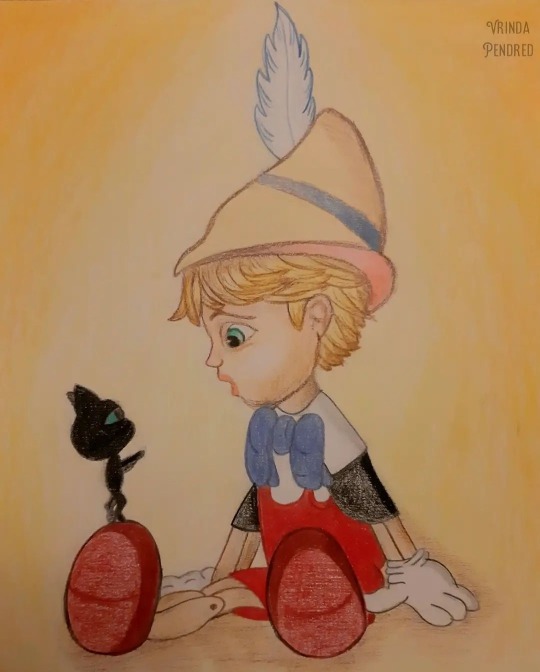
Data and Adrien’s ‘fathers’ (creators) have made other children, too – other androids and sentibeings – not necessarily to public knowledge.
Dreams
Over time, both Adrien and Data come to desire individuality. An integral part of this is having dreams. Adrien’s dreams come in the form of personal ambitions, beginning with his love for Ladybug. Data has ambitions, too, but his dreams also come in a more literal form, i.e. as he evolves, he starts dreaming like a real human.
'Evil' Twins
Another crucial part of being human is self-reflection, highlighted by Data and Adrien’s ‘evil twins’. For Data, this is Lore, made according to the same design but with his own personality. He obtains the emotion chip intended for Data. Where Data is all logic, Lore is all feeling without boundaries. He’s the emotional potential exploding unchecked.
Adrien has a few ‘shadow’ sides, which I’ve explored before. An obvious one is Felix, wielder of the peacock miraculous, i.e. the power of emotion. Then there’s Cat Blanc, who is all of Adrien’s darker thoughts and feelings bursting forth uncontrolled.
What Lore, Felix and Cat Blanc have in common is that they are abused sons, bitter and resentful that their fathers never gave them the love they longed for. They lash out from grief and trauma. Also, Lore killed his/Data’s father, while Cat Blanc killed Gabriel in an alternate timestream.
Data needs to face and deal with this ‘shadow’ side before he’s ready to receive the emotion chip intended for him and find the happy medium between the two extremes of the emotional spectrum. We see this when he is forced to deactivate Lore, thus inheriting the emotion chip, learning from the mistakes his brother made and trying to do better.
Likewise, Adrien needs to come to terms with his ‘shadow’ before he’s ready to face the final battle with Monarch. In Conformation, this played out as Adrien having the emotional maturity to recognised when he was out of control and make the decision to remove his miraculous, stepping away from the battle before he could do damage.
This is without even getting into the mirror universes in both shows, where Data has a much more direct ‘evil’ alter, and Cat Noir comes head-to-head with Claw Noir. (Sadly, we never saw Data hug Evil Data the way we saw our two Noirs accept each other.) There was also the very brief Copycat moment. Adrien’s had a lot of doubles.
It’s interesting to note that Lore believed he was superior to humans and had a genocidal plan, much like Felix snaps all the non-sentibeings out of existence in Emotion. Lore also dresses like Data and poses like him to fool their father and others on the ship, like Felix does with Adrien, attempting to fool Gabriel and others in Adrien’s life. A key difference is that Lore never really gets the chance for redemption, whereas Felix is only 14 and has his whole life ahead of him, with the opportunity for positive evolution. He discovers the love he’s lacked as a child and chooses to change.
At one point, Lore also implants the emotion chip in Data and uses it to control him remotely, inspiring anger and hate in him, thus weaponising him. Felix makes it very clear that he would never try to control Adrien. Instead, it’s Gabriel who controls Adrien via the twin rings, the Alliance, and magical dust causing him to live out his worst nightmare. In Cat Blanc and Ephemeral, we also see Gabriel akumatise Adrien, using his darkest feelings to transform him into a weapon.
Perfection
When Data first meets his brother, Lore convinces Data that he was created as a 'less perfect' version of him. When they are later summoned back to their father's secret home, Data learns this is untrue and is fascinated to realise that he is 'not less perfect than Lore'. Adrien, too, is repeatedly described as 'perfect'.
Cats
Data has a beloved pet cat. Adrien, of course, spends all his private time with Plagg. I also can't help but notice that Data and Cat Noir's eyes are similar in colour.
Artistry / Education
Data is a keen painter and violinist, and well-versed in just about everything, bearing in mind he was programmed with encyclopaedic knowledge. Adrien is a pianist and, thanks to his father’s programming, is also highly skilled in multiple disciplines and languages…and seems to know a lot of very random information, e.g. Morse code.
Undead Mothers and the Demented Fathers Who Can’t Let Them Go
Adrien’s father can’t get over the death of his wife and keeps her cryogenically sustained in the basement. Similarly, Data’s ‘father’ was married to a woman Data deems his ‘mother’. She, too, died long ago, but his father transferred her personality and memories into an android body. She’s the only android in the galaxy who can pass as completely human, even in medical scans.
Self-Sacrifice
Cat Noir is always sacrificing himself for Ladybug. We don’t know if he remembers those moments of death or not. He seems to throw himself in front of her on instinct, as if it were the natural order of things. He believes he’s not as valuable as she is.
In Star Trek: Nemesis Data sacrificed himself for Picard – although he did see himself as of equal value. In fact, he argued strenuously throughout the series for equal status with humans. And to all of us watching Nemesis…I can’t begin to tell you how hard his ‘death’ hit me.
On paper, it makes sense for an android – a robot – to sacrifice himself so a human may live. But we spent seven seasons plus several films getting to know Data. Android or not, he was a beloved character, he was a friend, he formed relationships. That’s why the crew gave him a full funeral and eulogies.
Likewise, Cat’s sacrifices hit Ladybug hard, something many of us fanfiction writers have explored in depth.
Programming
Perhaps the biggest difference is that Data knew he was programmed. He knew he was at the mercy of his microchip. He knew when his emotion chip was installed. He was wholly conscious of his developmental journey.
Yet, even after five seasons, Adrien has no idea. He doesn’t know he’s been programmed because he doesn’t know he’s a sentibeing. Like something out of Blade Runner – and like Data’s mother – Adrien would pass the Empathy Test and be deemed human yet still have no idea of his origins.
The fact is, you can’t break your programming until you know you’ve been programmed.
Data was given all the chances he needed to live a full life and make a fully informed decision about what he wanted to do with it at the end when he made that final sacrifice. Adrien has none of that. He was edging towards revelation, realising his father was controlling him somehow, but all of that was taken from him at the end of S5. It’s like if Data were given a hard reset.
Marinette’s choice to keep the truth from Adrien mirrors Data’s choice to keep the truth from his android mother. She believes she’s a human, the original woman she was made to replicate, and he chooses to let her carry out her life under that pretence.
'I want to be a real boy!'
As I said, Data and Adrien are both like Pinocchio, trying to be ‘real boys’.
At the end of Data’s life, it didn’t matter whether he was made by a scientist or by organic means. He touched people’s lives, and that made him real in all the ways that matter.
Similarly, if Adrien got snapped away, people would remember him. They would mourn him. It doesn’t matter if there’s a body left behind or not. He too has touched so many lives, and that makes him just as real and important as any organic human.
In these ways, I believe they both succeed at being 'real' regardless of how they came into being.
I bet I could think of more parallels if I tried, but this has already got long enough :)

#ml meta#ml analysis#data#star trek data#commander data#star trek tng#star trek nemesis#star trek spoilers#ml adrien#adrien agreste#miraculous ladybug#ml fandom#chat noir#cat noir#ml s5#ml s5 finale#ml conformation#pinocchio#character analysis#ml felix#ml gabriel#sentibeing#sentimonster adrien#ml sentimonster
13 notes
·
View notes
Note
One thing about the prequel drama between Jared and Jensen that I’ve always wondered is did Jensen tell Jared he was making ‘something’ related to SPN and just not tell him what or that it was in the early stages of production, or did Jensen not mention that he was doing something with their TV show at all?
To my mind they’re different things.
To not say anything over such a long period of planning it is clearly disrespectful and hurtful since it was their joint project for 15 years - the other means he had go ahead from Jared to do something, so the actual details weren’t as crucial to tell him about maybe until they were signed off.
Has either said anything to either effect do you know?
I love your perspective but the fact still remains that the project was in development for over a year and Robbie, for example, knew everything about it while Jared did not.
Also, Jensen full on lied about not having his phone on set, as demonstrated by the countless set pictures that emerged of him on the TB set next to his phone. Phones are taken away while an actor is shooting, during breaks he has ample time to do whatever he wants on his phone. This happens on every set, you do leave the phone in a designed area but once you are on break, you can retrieve and use it.
Also, from a legal standpoint Jared also represents the SPN brand and so he could potentially sue Jensen for not keeping him in the loop and moving forward on a project without first striking a deal.
If I am not mistaken, please feel free to correct me on this, Jensen had informed Jared he was considering creating something and would give him more details once they were available except this never happened. Just to be clear, details are hashed out way before the paper is dry. To go into production Jensen had to sign, so he had aaaaaample time and opportunities to inform Jared but instead kept quiet until the news was conveniently leaked which, by the way, may have been a part of his strategy to avoid certain repercussions. Even so, from a legal stand point Jared can still sue.
However, he is clearly choosing to maintain harmony as he is aware that they both could stand to benefit from SPN in the future and by also working together on other projects so he doesn't want to ruin the credibility of their public image which is what a lawsuit would indeed cause. I do completely understand why he chose going for harmony instead. He is thinking of the bigger picture and, unlike Jensen, he is extremely secure in his ability to reach higher successes so he doesn't feel the need to bank on TW.
69 notes
·
View notes
Text
MML Sci-Fi Au
Milo:

Milo in a space suit:

Melissa (she and Milo are waving at each other):

(her arms can retract into her body)
Lore:
In the far, far future, eight planets orbit a sun. While none of these planets are capable of sustaining life, people live in “bubble cities” on the surfaces of the planets, and on space stations orbiting around them. Their advanced technology allows them to survive- and among that advanced technology is robots.
Robots to clean their homes. Robots to serve them food. Robots to work in factories. Robots to drive their ships.
Robots to protect them. Robots to kill for them.
The Murphys live on a small, red planet called Rusoma, in the bubble city of Danville. Their unusual genetic condition- officially Extreme Hereditary Murphy’s Law, and more colloquially simply Murphy’s Law- can make life dangerous, especially in an environment where the lives of millions rely on technology. Despite this, they handle their condition well and prosper- but everyone can use some help.
When Milo Murphy turned six, his parents decided to buy a MEL robot- a Mechanical Escort Life-Preserver. The perfect babysitter and companion for their young son, the MEL robot can help him survive in all manner of disasters, big and small. She is even built to be child friendly. So they weren’t surprised when Milo immediately became attached to her, calling her his best friend and treating her like that.
What did surprise them was the MEL robot- nicknamed Melissa by Milo- developing sentience.
A few years later, Milo is thirteen. Melissa is his best friend, and treated as part of the family by the Murphys. But one day, disaster strikes. The family are called to the police office in the middle of the night, to discover that Melissa killed someone. Having left the house in the middle of the night, she malfunctioned and fatally attacked someone. At least, that’s the story.
Melissa insists that she didn’t do it, and Milo believes her. But she was found, shut off and covered in blood, next to the body. Her camera malfunctioned, leaving no footage in the time before and during the incident, and, crucially, her memory storage malfunctioned. She has no idea what happened, with a dark spot between entering the park and waking up at the police station.
Of course, a robot can’t be charged with a crime, as they aren’t supposed to be sentient. But everyone thinks that Melissa malfunctioned. And a robot that malfunctions and attacks innocents is dangerous. So the authorities decide to deactivate her. Milo is horrified, and when he can’t prove her innocence to save her he does the next best thing- he steals her back and flees the planet, becoming a fugitive to keep her safe.
But being a fugitive causes its own problems, and they will never be able to go home until they can find the truth. Because if Melissa didn’t kill that person, who did?
———
the sci fi au!!! I finally settled on designs for Milo and Melissa, and wrote up the lore post. So here you go!
So Melissa is smaller than a 13 year old, but taller than a 6 year old. And yes, she does complain about Milo growing taller than her. Regularly.
She doesn’t need a space suit to survive outside of cities/ships/shuttles/space stations ect, but she has a lil suit anyway because Milo
She is very, very protective of Milo. But at the same time, Milo is protective of her. They’re really close.
Aside from Milo and Melissa, I have stuff for some other characters. Obviously Zack is the one I thought about most after the two of them- Zack is also a robot. I haven’t come up with a name, but I want it to have an acronym like ZAC or ZAK. I’ll workshop that. But basically, he’s one of the ‘killer robots’ that were the whole point of the original concept for this au- he has been built and programmed as a protector for exploring hostile planets outwith the solar system.
In practise, Zack is considered a defect. He developed sentience, and was unable to convincingly act like a ruthless, unfeeling robot. So he was literally thrown out, and Milo and Melissa find him in a rubbish dump while searching for scrap. They adopt him, and his arc is about learning that even if he can’t do what he is made for, he isn’t worthless.
Also his design, which i haven’t perfected yet, is based off of Warhammer 40k Kastelan robots, if you wanna get a feel for what he’ll look like. I love Kastelan robots, they look so fun and chunky.
Cavendish works for the Solar Government. Dakota is a robot, and his bodyguard. Dakota is a “defect” like Melissa and Zack, but hides it well because he wants to stay with Cav to protect him. Cavendish is assigned to capture Milo and Melissa, hijinx ensue.
I’m not sure what direction I’d want the story to go in, but I’m leaning towards a murder mystery- but a murder mystery in space. The main plot being focused on Milo and Melissa figuring out who really did that murder, so they can go home.
Obviously a lot of stuff isn’t finalised, but I hope you like what I’ve got so far!
@cantdanceflynn I know you’re a robot fan :)
#mml#milo murphy’s law#milo muphy#melissa chase#zack underwood#vinnie dakota#balthazar cavendish#I drew a thing#mml sci-fi au
23 notes
·
View notes
Note
if you had been writing the women in metal gear what would you change with them (a lot i know) because i feel like just the idea of women being written well in metal gear will benefit us all
I'm answering but just so we all know my qualifications here are just that I'm a woman I am not a writer or game designer or whatever also as it goes on I get more pissed off so it gets a little messy structure wise hope that's ok anyways here's what I wrote:
Um ok, so it would take sooo long to write a full structured analysis so I'll give little things for each character. Uhh mgs1 make Meryl less of just a flat love interest stand-in because the rest of her backstory in that game feels like it’s shoehorned in to make it seem like she has actual character when she's just meant as the glorified damsel in distress (not to say she can't need help but a lot of it felt like a bunch of "leave me Snake, I can't help you I'm just a GIRL!!"). Also, this is just my personal HC but it would add so much to her if she was transgender but it's not like NEEDED- anyway also Naomi was meant to be brown idk what happened but I would return her melanin to her I think.
Mei Ling is mostly fine character-wise but I would remove all of Snake's weird advances and comments about her. I would actually remove that from all of his interactions with women in that game I think.
OH and Sniper Wolf should put the thangs away I'm thinking like a fur coat and also I want her whole character to be more than just a sexy lady with a tragic past. her speaking in a seductive voice 80% of the time and just being honestly creepy was stupid. I think she could just be a person maybe. that would be cool I think. She could've been just tough and standoffish and then revealed her true feelings as she was dying instead of all the weird seductive stuff
Ok now Mgs2, Fortune is pretty much fine but I wish she didn’t have her booty cheeks out on the seemingly cold big shell bc Raiden was shivering and sneezing like a little wet dog when he lost his suit so I'd assume she’s cold too. if she was wearing some cool pants or something that would be neat but other than that I think she's pretty well written.
next Emma ummm her personality itself isn't the issue to me but I didn’t like how Raiden was kind of creepy towards her (not really but like. “You should wear contacts” I'll punch him maybe).
Also, she should've had a cooler outfit but that's it. Honestly, I’d have to rewatch or replay Mgs2 to get a good grasp of her character but I see no crazy issues.
Rosemary omg I think she’s fine but I hated how it kind of felt like it was Raiden and Campbell vs Rose and she always loses even in non-canon codecs it was so annoying. Other than that once again I will have to listen to the codecs again because I haven't heard all of them in a while. Actually, I just remembered I didn't like how she was kind of written to be oddly insecure?? Ig?? I mean she spent a lot of time in codecs talking about personal stuff and not the mission which I guess was intentional but I found it odd. Olga’s fine no notes. Don’t think there's anyone else.
(skipping mgs3 bc it only has 3 women and I think they’re all written ok I don't have many issues.)
Ok, mgs4 for the B&B unit I will refer you to this post because I’ve already talked about it.
other than that Meryl was actually really good until the final part on outer haven that was so bad “I can't protect anyone” or whatever she said girl fuck off the only reason she said that was so that big strong man Johnny Sasaki could come to save her omg fuck you also Johnny Sasaki should die that's crucial to this
anyway, Mei Ling was fine but I’d remove the codec call where Otacon and Snake say that Mei Ling probably just slept with older men to get to her job position I just think I wouldn't have that in the game probably.
Naomi ok so I haven't finished mgs1 so I can't tell you exactly if what she does in Mgs4 is fucked up compared to how she is in mgs1 I mean personality wise but also I was eating a really gross ass sandwich when I watched one of her long cutscenes and it skewed my perception of her a bit oh also I would personally like to button her shirt up for her.
uh idk Rose once again was fine but also I’m killing everyone for the mistranslation from the JP version of mgs4 that in English made her seem like some evil liar idk anyway you look that up if you really wanna know it’s on Twitter.
uh who else does Sunny count doesn't matter she's fine no issues.
GZ you already know what I'm going to say also TPP so I'm skipping it also I'm not wasting my time getting triggered for no reason so like read my mind or something
Because I skipped 3 games I’ll do MGR Courtney her character itself was fine I didn't like the codecs where 1 Raiden jokes that she should get lipo and 2 the call that's just Raiden and Kevin talking about how much they don't wanna date her also her design is so like beauty standards boring as shit at least make her look cool or something idk.
and Mistral I’m so tired of femme fatale characters in Metal Gear it’s not cute it’s not like empowering the way it’s done her entire character is sexualized and it is JUST because she's a woman. I said this about Wolf too it’s hard to feel bad for a character’s sad war backstory when it is also very clear they’re just meant to be a sexual object with no substance it’s not cute either it's just stupid.
Also, there’s other stupid sexist codecs about her too obviously lastly uh Sunny’s also in it she's fine whatever
also i just noticed i skipped peace walker but like whatever its fine lol
8 notes
·
View notes
Text
The far right has now become the leading political cause of climate disaster. In the US, the far right and the Republican Party are increasingly one and the same.
A recent paper in the scientific journal Nature identifies the “human climate niche”: the range of temperatures and rainfall within which human societies thrive. We have clustered in the parts of the world with a climate that supports our flourishing, but in many of these places the niche is shrinking. Already, around 600 million people have been stranded in inhospitable conditions by global heating. Current global policies are likely to result in about 2.7C of heating by 2100. On this trajectory, some 2 billion people may be left outside the niche by 2030, and 3.7 billion by 2090. If governments limited heating to their agreed goal of 1.5C, the numbers exposed to extreme heat would be reduced fivefold. But if they abandon their climate policies, this would lead to around 4.4C of heating. In this case, by the end of the century around 5.3 billion people would face conditions that ranged from dangerous to impossible.
As the climate situation grows worse, the far right climate deniers become increasingly shrill and aggressive. Extremists have made climate denial part of culture wars.
Culture war entrepreneurs, often funded by billionaires and commercial enterprises, cast even the most innocent attempts to reduce our impacts as a conspiracy to curtail our freedoms. Everything becomes contested: low-traffic neighbourhoods, 15-minute cities, heat pumps, even induction hobs. You cannot propose even the mildest change without a hundred professionally outraged influencers leaping up to announce: “They’re coming for your ...” It’s becoming ever harder, by design, to discuss crucial issues such as SUVs, meat-eating and aviation calmly and rationally.
Climate science denial, which had almost vanished a few years ago, has now returned with a vengeance. Environmental scientists and campaigners are bombarded with claims that they are stooges, shills, communists, murderers and paedophiles.
Being in a place that's particularly sensitive to climate change does not mean you will automatically end up with more responsible leaders. Case in point: Florida Gov. Ron DeSantis.
In some cases, the cycle plays out in one place. Florida, for example, is one of the US states most prone to climate disaster, especially rising seas and hurricanes. But its governor, Ron DeSantis, is building his bid for the presidency on the back of climate denial. On Fox News, he denounced climate science as “politicisation of the weather”. At home, he has passed a law forcing cities to continue using fossil fuels. He has slashed taxes, including the disaster preparedness sales tax, undermining Florida’s capacity to respond to environmental crises. But the hard right thrives on catastrophe, and again you get the sense that it can scarcely lose.
Tackling climate change internationally reduces the flow of climate refugees in the medium to long term. The GOP solution is to have corrupt contractors build third-rate walls and to dump migrants in the states of political opponents.
If you want to know what one possible future – a future in which this cycle is allowed to accelerate – looks like, think of the treatment of current refugees, amplified by several orders of magnitude.
The international far right thinks refugee-hatred is more politically advantageous to them than mitigating climate change.
Already, the manufactured hatred of refugees has helped the far right to gain or share power in Italy, Sweden and Hungary, and has greatly enhanced its prospects in Spain, Austria, France and even Germany. In every case, we can expect success by this faction to be followed by the curtailment of climate policies, with the result that more people will have no choice but to seek refuge in the diminishing zones in which the human climate niche remains open: often the very nations whose policies have driven them from their homes.
It is easy to whip up fascism. It’s the default result of political ignorance and its exploitation. Containing it is much harder, and never-ending. The two tasks – preventing Earth systems collapse and preventing the rise of the far right – are not divisible. We have no choice but to fight both forces at once.
In the US, 98% of all Democratic candidates are better than 98% of Republican candidates on climate change. There are rare exceptions, and nobody is 100% perfect. But the best way to fight both fascism and climate change is to vote Democratic and not to miss a single election for any level of government.
Biden gets backing of leading environmental groups for re-election
Be A Voter - Vote Save America
#climate change#the far right#fascism#climate deniers#republicans#the gop#culture wars#ron desantis#florida#climate refugees#climate migration#election 2024#register and vote#vote democratic#george monbiot
12 notes
·
View notes
Text
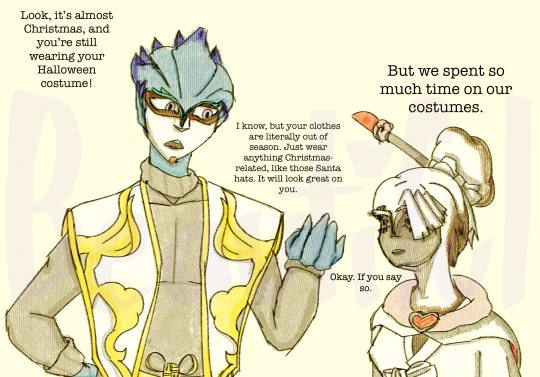
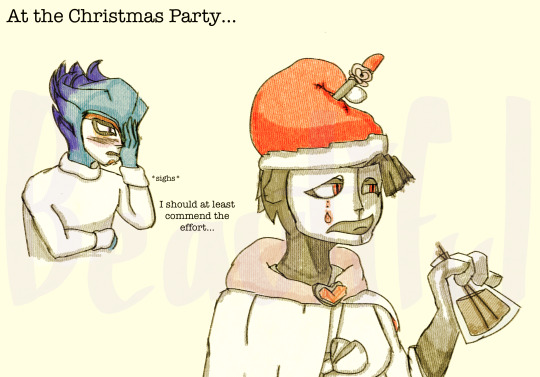

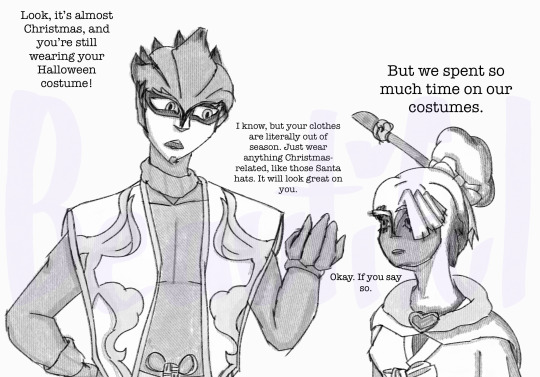



John 3:16-17 (KJV)
16 For God so loved the world, that he gave his only begotten Son, that whosoever believeth in him should not perish, but have everlasting life.
17 For God sent not his Son into the world to condemn the world; but that the world through him might be saved.
I had arisen from the pits of college!
College was pretty hectic so I only managed to post something for Halloween because we had a lot of free time, but after that, I needed to focus on my studies and some other stuff.
I’m currently making another FNAF Character Illustration but I wanted to make this sketch comic. I saw this trend where you put Santa hats on your profile picture and I wanted to participate. Then I decided to make this comic revolving around that.
Since the profile picture is literally from a Halloween art piece I thought it’d be funny to put a Santa hat on it. The comic is an in-universe explanation for her dress-up.
I tried to have them be in character as much as possible. This scenario would take place after Charming Gold and Dazzling Diaspore were redeemed and they just coexist with the Running Men without conflict. CG and DD would be platonic housemates, but that depends on my interpretations of them. In this version, they’re more like friends, but in the original art they’re kind of a couple.
Side note: I drew CG in a turtleneck with prominent cuffs because I thought it would suit him. CG’s character design has him wear a black bodysuit with cuffs so I honestly can’t imagine him wearing anything else that doesn’t fit his character silhouette.
I placed a yellow filter on the comic because while I was studying historical art style for class I really liked the Gothic art style. The reason why everything is so yellow is because light was a crucial part of the architecture, and in turn, influenced the paintings. It is also because I wanted my digital art to resemble traditional art more so the canvas color also has a yellow tint on it.
Merry Christmas everybody!
REFERENCES:
https://www.blueletterbible.org/kjv/jhn/3/16-17/s_1000016
Running Man Animation was created by LINE Friends Corporation and SBS
Dazzling Diaspore belongs to me/@beautiful_02.08.18/beautiful-02-08-18
#God#Christian#Christian creative#Christian art#Christian artist#Christian blog#Merry Christmas#Christmas#Happy Birthday#running man animation#Fanart#running man animation fanart#running man animation oc#art#comic#yellow#gothic art#Gothic art style#Santa hat#oc x canon#grayscale#running man korea#Running man#filipino artists#hyperfixation#fyp#Christian tumblr
6 notes
·
View notes
Text
“what’s the occasion?”
“what?”
“what’s the occasion? the shirt and pants.”
well, now how do i go about this explanation?
i could indulge in the absolute wonder
that was the euphoria that hit me
when i wore this for the first time;
be brutally honest with them
about how i’m just barely a woman.
or i could tell them all my dresses were too wrinkly,
rather than expose myself so blatantly like that.
given this crowd,
and given i’m a coward,
one of those choices seems obvious.
but for the first time using that line,
i felt truly dishonest.
it was like saying that was a disservice to myself;
like i had failed to defend my brothers and sisters and siblings
who felt the same about wearing or not wearing dresses;
like i was disowning the art i was there to present.
i said
“i have created you,
all of you,
in my image,
every fragment of myself and my identity
was a crucial part of each of you.”
and then distanced myself from them
to avoid being associated with them.
“my dresses were too wrinkly.”
“your art was kind of dark.”
“you think so?”
“it seemed dark to me.”
now, how do i explain that?
do i tell them that my art was not for them,
that it was not created with the standard in mind?
do i announce that it was made for every type of person they hate?
i could silence their distaste
by outing myself among them
but then i’d throw away all the respect i’ve garnered for myself
and i don’t know if i can do that yet.
i could just say that they don’t get it
say “sorry,
i guess you entirely missed what i was trying to say.”
but then
as soon as the artist presents it
it’s up for interpretation
and it doesn’t matter what they meant.
it’s just the same as insisting
the hair under my chin is only there
out of laziness
rather than any sort of intent.
so then, does it matter what i was saying?
to those who understand, congratulations,
you were my real audience
but it doesn’t matter how i paint myself
if it’s going to be grossly misunderstood and criticized by the masses.
“i guess it turned out that way, yeah.”
“i think if you did this instead
it would better depict women as strong
and not weak and controlled.”
i feel as though you aren’t listening to me at all.
she’s not a woman, she is me
and i am detailed by my eternal struggle
to fit in confines that i maybe liked once, just not anymore.
she is controlled, yes
she is controlled by the world that doesn’t care
for things it can’t sort into neat piles
of “either this or not this.”
she is crying because of those chains
just like he is embracing his “unsightly” designs
because he is not designed to appease anyone
and he did that to himself, for himself.
but they are still stuck on fragments of their womanhood
despite hating it so
and i can’t even use the title i want
because that’ll be too on the nose.
i’ve already used three flags as color palettes
and you still don’t get what they’re about?
flowers of sappho’s poetry, so sweet and so vibrant,
yet finding it impossible to say “that’s me;”
being trapped within the jaws of the beast that wants only to devour you,
yet not being able to tell them “don’t touch me that way;”
redesigning yourself, reconstructing the canvas of you for yourself,
yet still telling people the names and words you detest are “fine.”
i’m still dancing around the words that i should say blatantly
for this and for them and for myself.
“i could try that, sure.”
— i left my dignity at the windowsill with my paint water cup
#something something#i was showcasing art from my portfolio on identity w/ the pieces about queer identity while undergoing a gender crisis. did no go over well#the patron saint of asexual poets#poetry#poem#poems#original poems#original poetry#original poem#original writing#creative writing#poets on tumblr#writers on tumblr#lgbtq poem#lgbtq poetry#lgbtq poet#lgbtq poems
6 notes
·
View notes
Text
Charade (1963)

1963’s Charade is a comedy, a romance and a suspense thriller all at once. The mix seems incompatible, particularly when your lead couple is separated by 25 years, but the results work. So well. In fact, much of what makes the film special are the ingredients other movies would’ve eliminated. It’s got so many twists it’ll make your head spin off its axis and there’s no way you’ll guess the ending.
Returning from a skiing holiday in the French Alps, Regina “Reggie” Lampert (Audrey Hepburn) discovers her apartment stripped bare, her bank accounts empty and the husband she was about to divorce dead. His four passports - all under different names - lead the police to suspect foul play. All signs point towards the three men who attend his sparse funeral (played by James Coburn, George Kennedy and Ned Glass) being involved in his murder. They threaten Reggie, warning her the money they’re owed better show up soon. With the help of a charming American stranger, Peter Joshua (Cary Grant), Reggie begins sifting through her husband’s last possessions for clues.
From the colourful and stylish opening credits (Designed by Maurice Binder), you know you’re in for an unusual treat. This movie is bright and shiny. When Reggie and Peter are together, all you can think about is them but he’s apprehensive. She just lost her husband - she didn’t love him. They’ve just met - and aren’t they great together? There’s such a big age difference - she doesn’t care, why does he? The banter they have back-and-forth is full of great, witty lines, the kind you want to memorize and pull out at the right moment to knock all your friends off their feet.
But wait. This is a romantic comedy… but it’s also a thriller. Just when you think we’re getting ready to zoom in on that first kiss… a dead body. A hideous murder. A gun. Now you’ve got to wonder. Is he actually hesitant to get with her because of some chivalrous impulse… or is he stringing her along for nefarious purposes? What if it's the opposite. Maybe Reggie knows something we don’t and she’s trying to seduce it out of Peter. Maybe their coincidental meeting wasn’t a coincidence at all! But no, there’s no way there could be anything sinister between Cary Grant and Audrey Hepburn. They’re simply too good together to be anything but a couple waiting to fall in love.
That’s how you feel during the whole movie. One moment, you’re in knots over the thriller elements. You wonder if the unhelpful CIA agent (Walter Matthau) is up to something no good… until you remember this is a comedy. You think it’s getting fun and screwball-y with people looking into rooms for clues to figure out who’s got the money… and then someone turns up dead. Yikes! This movie keeps you on your toes in a way you’re not used to, which might make it more enjoyable on a second viewing. Then again, this first ride is a blast as you try to figure out who’s lying, who’s going to betray who, what’s a real clue, what’s a dead end, and so on. Not that you’ll be able to figure it out on your own. This is not the kind of movie that will linger on a piece of paper to give away a crucial detail. You might be able to guess certain motivations but where the money went? No way. I suppose you could call that a bit of cheat - part of the fun is usually piecing together all the puzzle's pieces and seeing if you can beat the detectives to the conclusion - but this isn’t a normal thriller. Not at all.
You could never recreate the magic of Charade. You might be tempted to, with the one fight scene that’s a bit clunky and another where everyone decides to go with the flow instead of calling the police, but too much of what makes this movie good is unique to when it was made. The actors fit their roles so perfectly it would be foolish to recast them. The dialogue is too magnificent to be tweaked. The atmosphere is a perfect mix of romance, mystery, and danger. It’s a great choice if you want to know what made Audrey Hepburn and Cary Grant icons. (May 14, 2021)

#Charade#movies#films#movie reviews#film reviews#stanley donen#peter stone#marc behm#cary grant#audrey hepburn#walter matthau#james coburn#1963 movies#1963 films
2 notes
·
View notes
Text
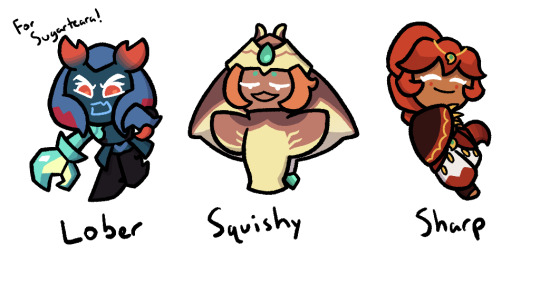
I wanted something to draw, so I decided to continue my Favorite Cookies thing, so here’s the 3rd batch, featuring animal based Cookies
Also I was planning on having them all say things, but I couldn’t think of anything for Mocha Ray and Scorpion to say, so only Lobster says things
Lobster Cookie: I really like Lobster Cookie. First off I just like his design. Honestly I didn’t think I’d like a lobster as much as I do. Second I just think he’s interesting as a character. Despite being part of the Cookies of Darkness he’s probably one of the least evil of the group, considering he’s being manipulated. And even in the Sugarteara storyline, he doesn’t seem a bad guy, just being manipulated into thinking darkness is the way to save Sugarteara. And it’s clear he still loves the city and still takes his duties seriously
To be honest, I really want to see him interact with Dark Choco Cookie, because they’re very similar, yet different in crucial ways. Lobster wasn’t the cause of Sugarteara’s fall, and he still believes that it can be saved, though he’s blinded by that drive and doesn’t see that what he’s doing is wrong. Meanwhile Dark Choco is the cause of his kingdom’s fall, and he’s given up all hope of making things right. He knows what they’re doing is wrong, but seems to be here more as a form of self punishment than anything else, thinking this is the path he deserves. It’s kind of funny, they sort of each have what the other lacks; Dark Choco has the awareness to know what they’re doing is wrong, and Lobster has the hope that things can go back to how they once were. There’s also the fact that they both lost a physical part of themselves, but there’s a clear difference in how they feel about those things. Lobster lost his claw defending the temple, but he sees it as a symbol of his loyalty to Sugarteara and says he would gladly lose his other claw for the sake of it. Meanwhile Dark Choco lost his eye during his duel with his father, and while I don’t think we know how he feels about it, it’s likely that he sees it as a constant reminder of his actions and wrongdoings. I wonder, if the two were to team up and actually talk about each other’s past and motivations (because I doubt they’d do that normally, they’d probably both just see any mission together as a job to do and not talk much to the other), could they maybe help the other see that they can abandon the path of darkness and find a better one?
…sorry I’m in my literature class and I think it’s influencing me. I kind of want to write an essay on these two now, but I think I condensed all my thoughts here
But in any case, honestly I really want Lobster and Mocha Ray to be in Kingdom, but I don’t know how Sugarteara could reasonably fit into the narrative. I mean I suppose it could be a side story, but then Lobster is part of the main villain group, and that’s kind of important. Ah well. It would be nice, but I’m not sure if it would happen
Mocha Ray Cookie: to be honest, I love her mostly for her design. She looks so soft and squishy, I just want to hold her in my hands and like, gently squeeze her. That sounds weird. But you get what I mean? And she makes adorable noises when she slides, she sounds like an owl. I just really like her from a design perspective
And I hope she and Lobster are able to meet again and make up. To be honest I don’t know much about her from a personality perspective, but she seems interesting. It’s more about the aesthetic for me
Scorpion Cookie: similar to Mocha Ray, I mainly like her for her design. It just looks really cool and I love the colors. I also just want to know more about her. I like how she seems nice, but also I know she’s an assassin and that niceness may just be a facade, but she still seems interesting. I would also like to know more about the history between her and Lilac, and if there’s ever gonna be a confrontation about them with that
I also want her to be in Kingdom, and have a whole Yogurca update of some kind. I suppose it’s not urgent, as from what I can tell, Yogurca has no significance to the overall plot, so you can save it for after the Dark Enchantress storyline ends or just as a side story, but I’d like them to at least have some sort of update with them
Yeah I had much more to say about Lobster than either of the other two, but that’s probably because he’s been a target of my hyperfixation before, whereas the other two are more just Cookies I like looking at
Though now I’m curious what a group comprised of these three would do. Though I also imagine Scorpion would end up as some sort of third wheel here, given the other two’s history
#cookie run#cookie run ovenbreak#favorite cookies#lobster cookie#mocha ray cookie#scorpion cookie#my art#I feel like Lobster looks a bit off but I can’t quite place it#also yeah I didn’t know what to put for their funny names#so you get that
10 notes
·
View notes
Text
While I’m complaining, I’m blown away by just how LAZY a lot of the design/world building in the His Dark Materials tv series is.
Like... they almost never bother to put daemons in unless it’s plot-relevant. In spite of the fact that daemons cannot go far from their humans and this is a major plot point that is crucial to several major parts of the story. Are we just supposed to believe that all the daemons are small creatures and they’re all hiding in pockets all the time? a) there should be a healthy number of larger daemons about, and b) even the small ones should be visible most of the time given that they’re sentient parts of the humans who interact with their world??? I genuinely don’t know if Mrs Coulter’s daemons’s frequent absences are intentional and supposed to be an insight into her character like they are in the books, or if they just couldn’t be bothered to make the monkey unless he’s directly relevant.
And the angels. In the books they’re shimmers in the air that are hard to see straight on, and they’re not totally corporal. And look, sure, I get why they might’ve wanted to change that up for the screen, but the choice they went with was to just make them blokes in robes. Occasionally they become shimmers to travel, and that’s cool, but 99% of the time? Just guys. They don’t commit to any cool design ideas beyond the odd moment here or there.
Also the alethiometer is butt ugly in this show, but I will accept that that one is to some extent a matter of personal taste. (But I am right).
8 notes
·
View notes
Text
probably should not be as surprised as I am but it is really bizarre and more than a little crazy-making to see ostensibly “progressive” or “”intersectional”” people suddenly digging in their rhetorical heels at the idea that abortion is not exclusively a Women’s Issue—crazy-making for a variety of reasons including (but not limited to):
if you think that it somehow undermines the urgency of abortion rights to acknowledge that not all women can get pregnant and not all people who can get pregnant are women (both of which are patently true facts), then you are a fucking idiot, full stop.
even if we ignore how abortion is a key piece in the larger puzzle of reproductive rights, abortion access specifically is still an issue that very much affects people who don’t get pregnant (including, yes, straight cis men). the effects of an unwanted pregnancy are obviously not the same for the person who gets pregnant and the person who got them pregnant, but that doesn’t mean only one party is affected; there are the obvious dire examples of families where a mom with five kids dies in childbirth and a now-single father is tasked with raising those children on his own, or the financial consequences of unplanned (or even planned) pregnancies on families, or even that [presumably cisgender] men under 20 who were involved with a pregnancy that ended in abortion are almost four times more likely to graduate college than [cisgender] men under 20 who were involved with a pregnancy that did not end in abortion.
the effects of an abortion ban are obviously very, very tangible, but they’re also implicatory—both in the broad realm of reproductive rights and the even larger scope of bodily autonomy + medical paternalism. we’re seeing this in increasingly relevant and scary ways with this onslaught of anti-trans bills and the lurking threat of reinstated anti-sodomy laws, not to mention the idea that legislators are somehow granted more power to make decisions about your health than you or your doctor. (which, if you wanted to go down that road, this kind of medical-paternalism-but-not-even-from-a-medical-professional is already evident in america’s health system when you look at how private insurance companies routinely issue denials for necessary medical care, but let’s not digress.)
ultimately, abortion bans are part of a larger conservative(/evangelical) playbook for enforcing social control by rewarding or punishing certain kinds of behavior. (see above about anti-sodomy laws.) you could say it’s about instilling a specific set of “values”; you could say it’s about power. I’d argue that what we’re witnessing is more or less a uniform attempt to enforce a single set of values across the board, it’s just that people are punished disproportionately depending on how far they deviate from the designated norm—which is where the crisscrossing effects of race, class, gender, sexuality, ability, nationality, religion (and so on) become crucial. to single out one such group as being the sole target discounts both the compounding effects of intersecting marginalized identities and the way that even groups within the “norm” are subject to scrutiny and potential punishment for stepping outside of increasingly rigid social boundaries.
if you want to dive deep into the roots of the pro-life movement in america, it turns out that the galvanizing force that made abortion the pet issue of the religious right (and in turn supercharged the religious right into the powerful voting bloc we see today) was never really about negating “a woman’s right to choose”—it was about defending racial segregation in religious institutions.
35 notes
·
View notes